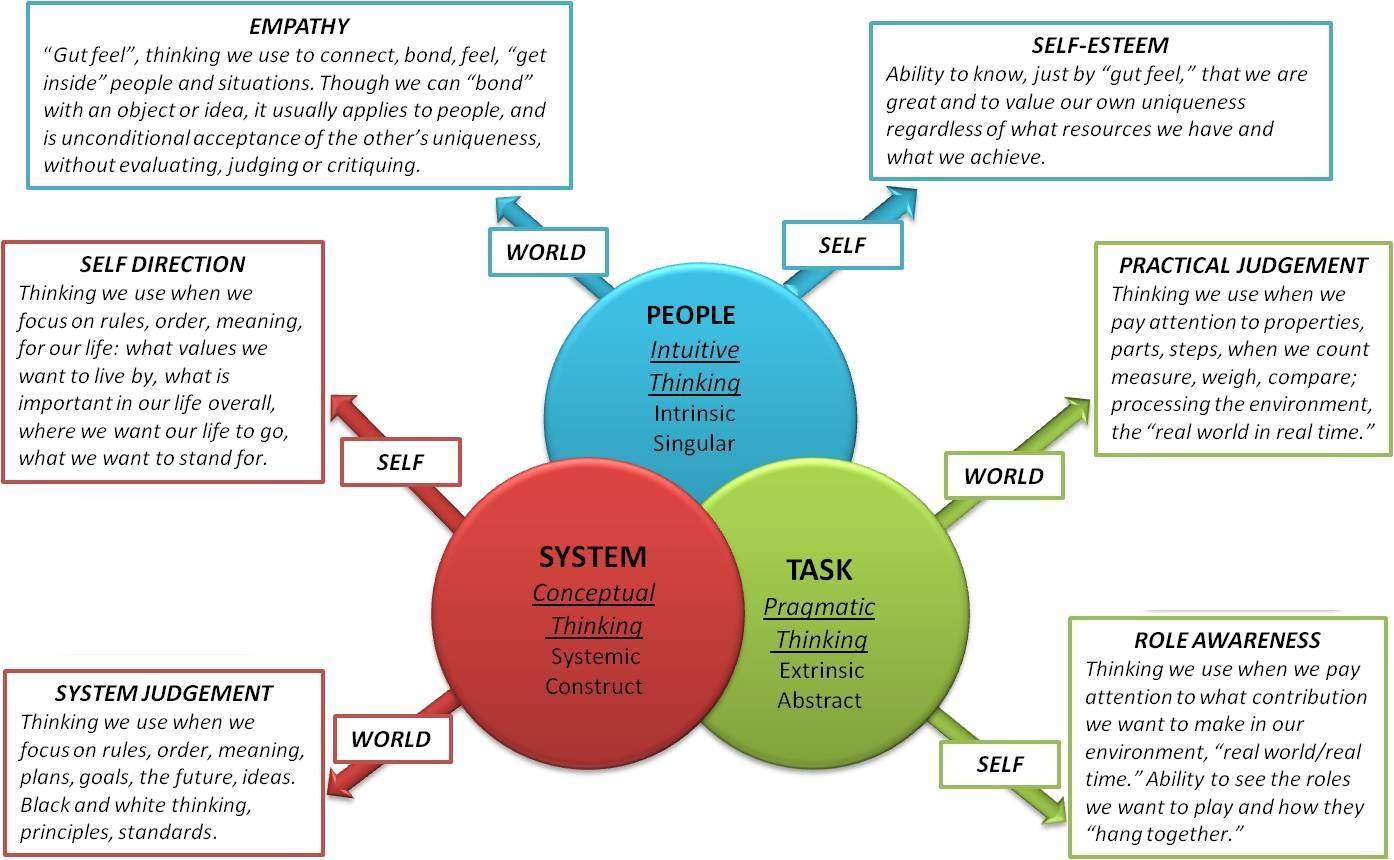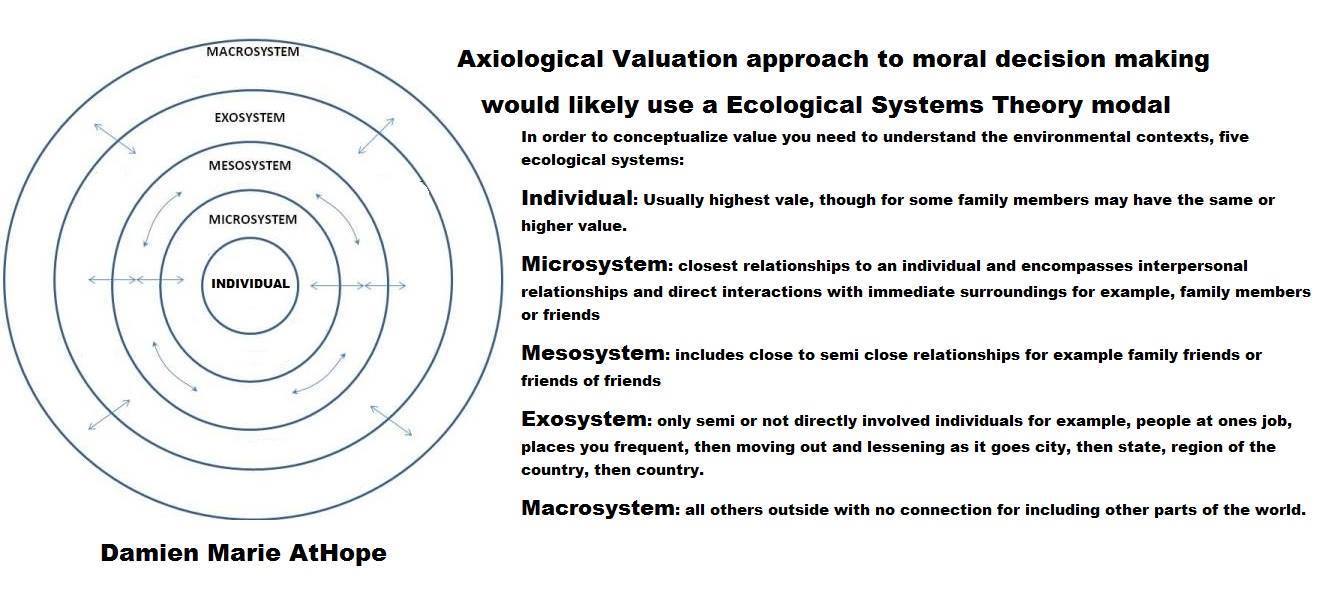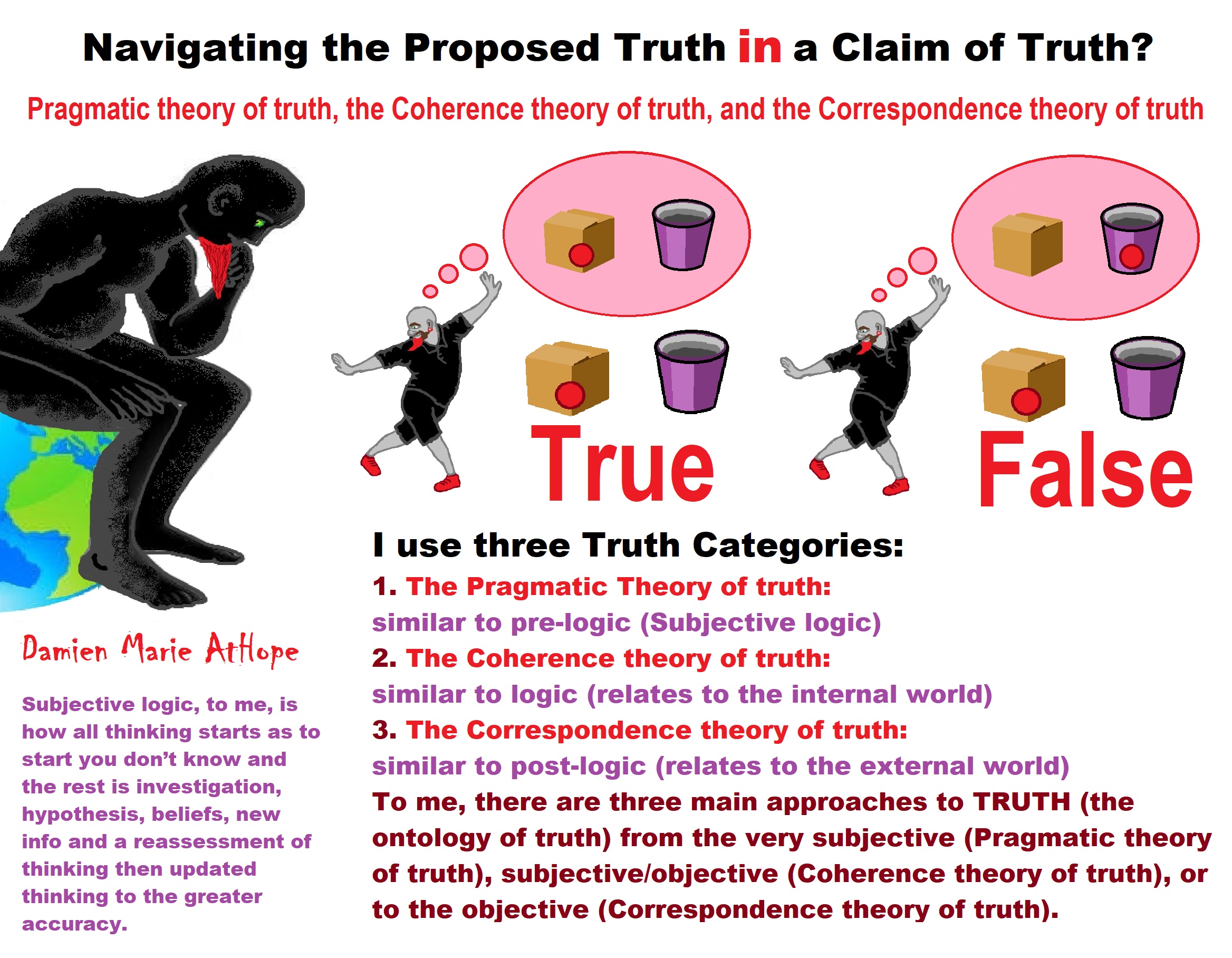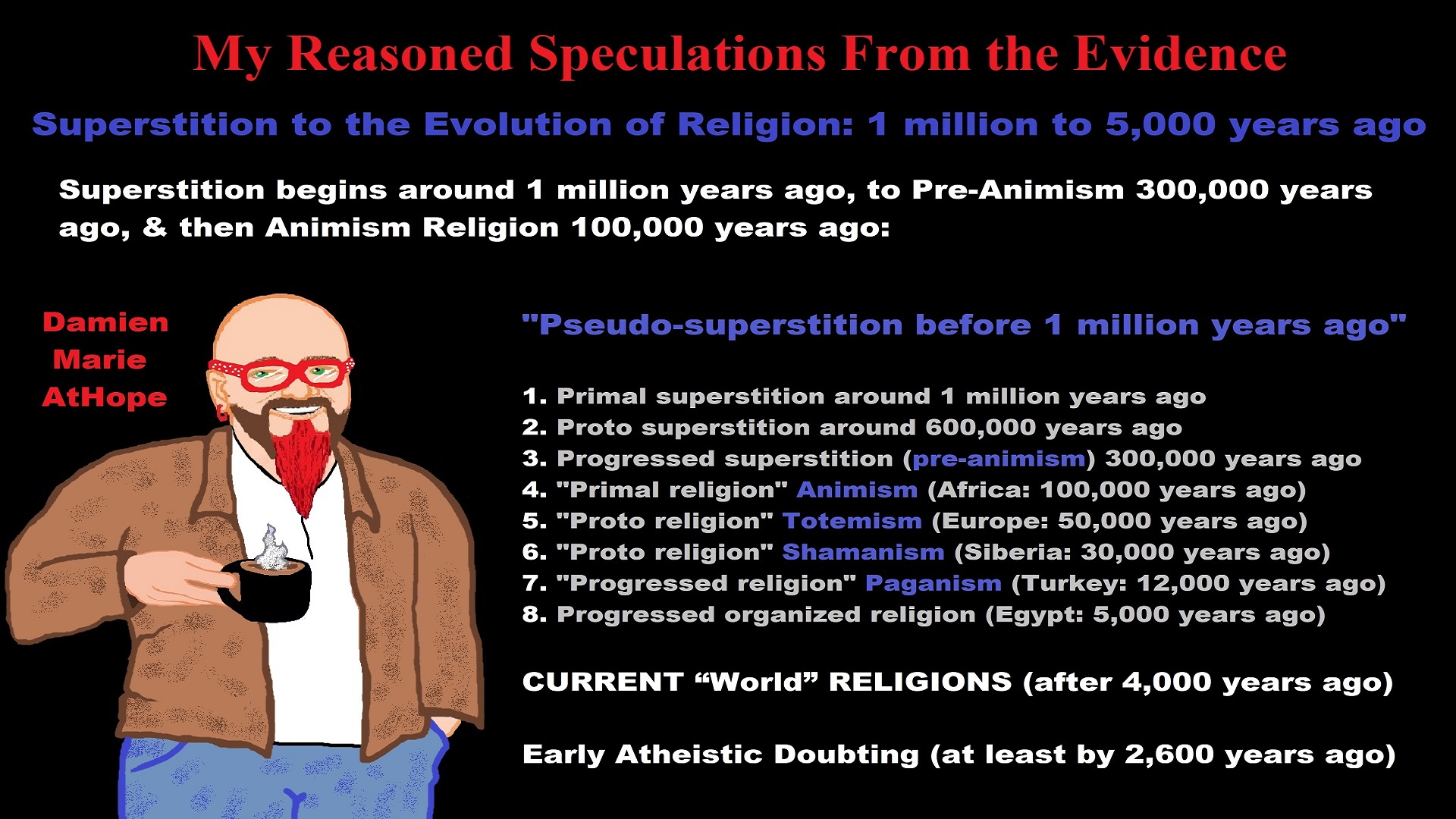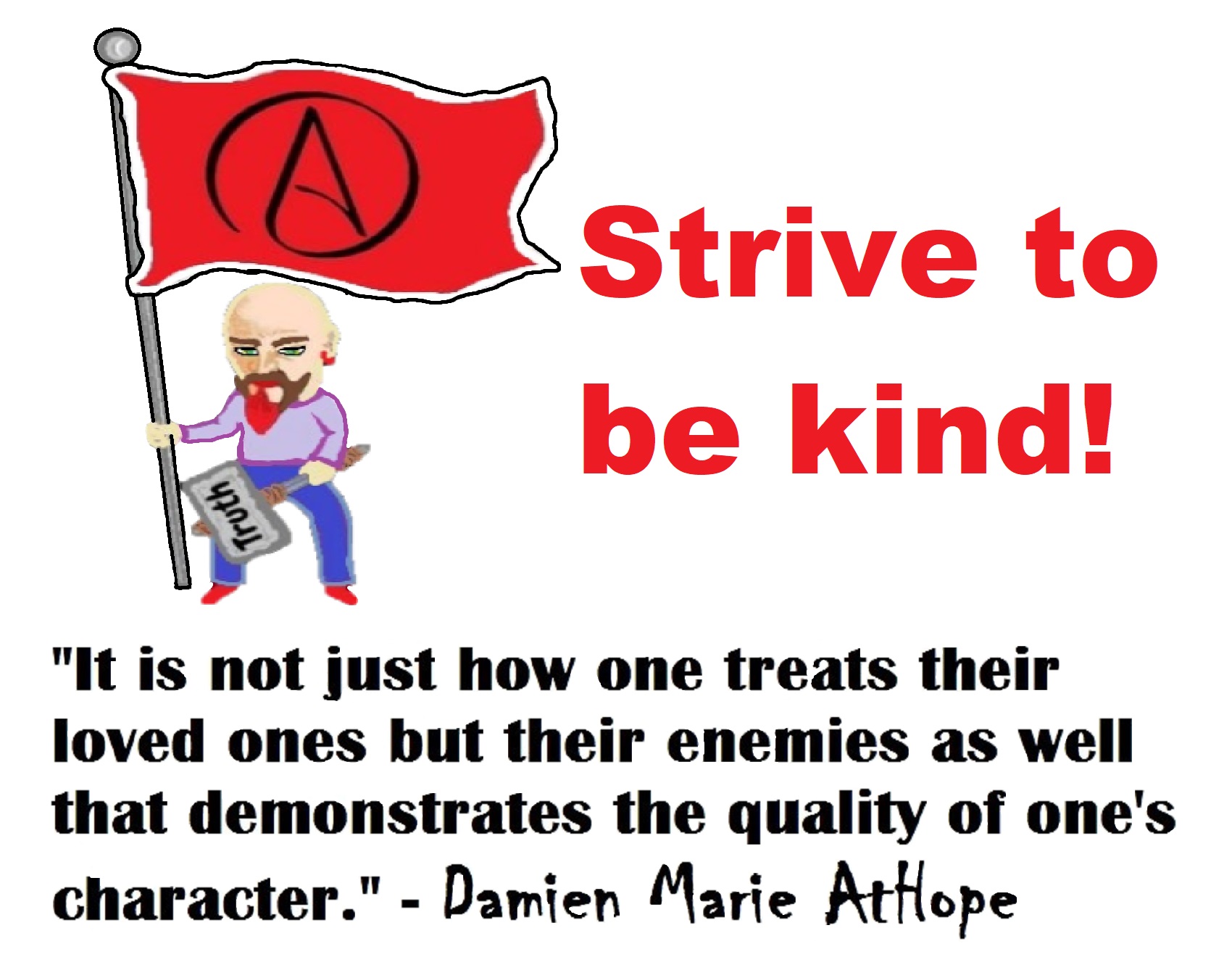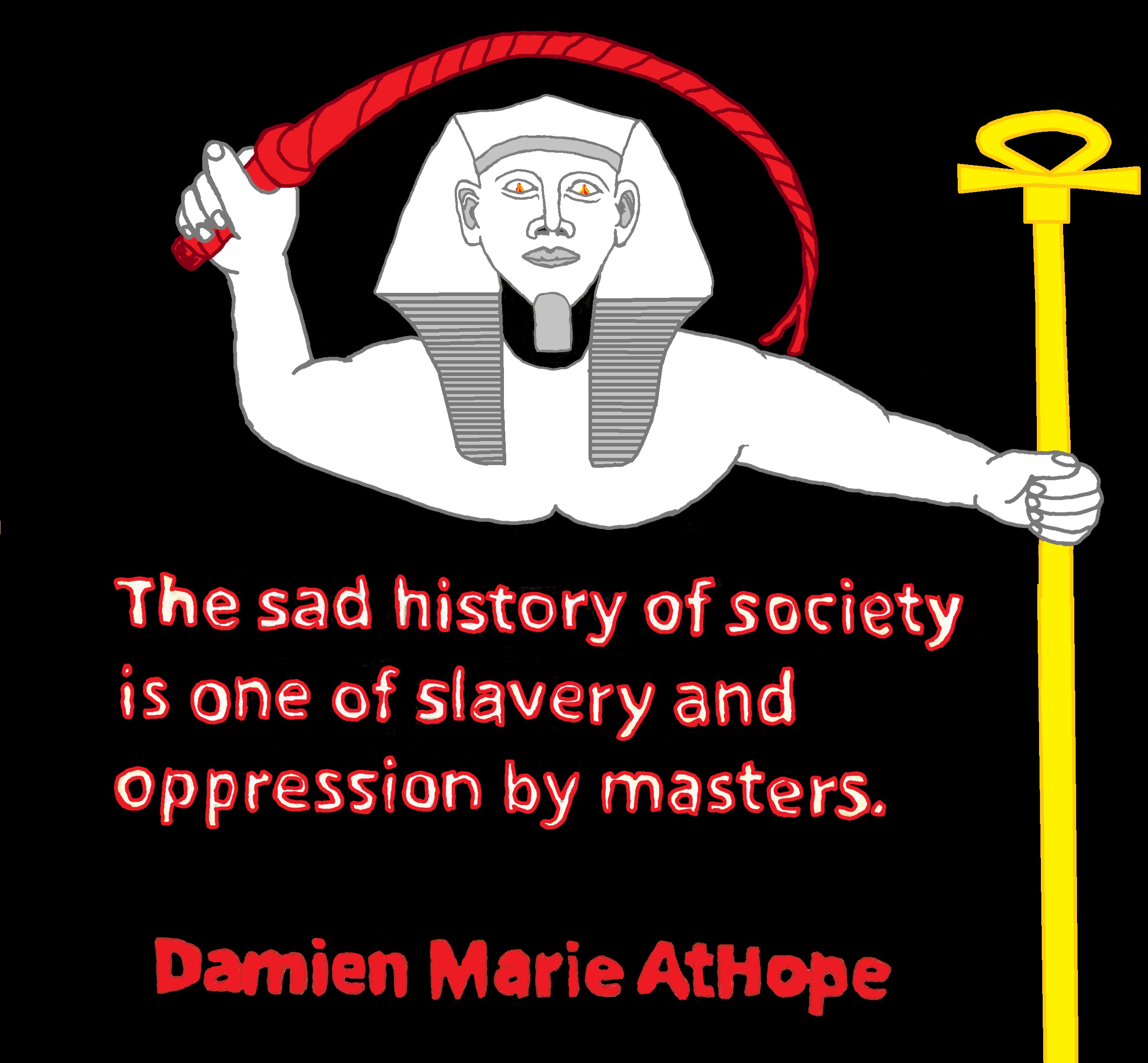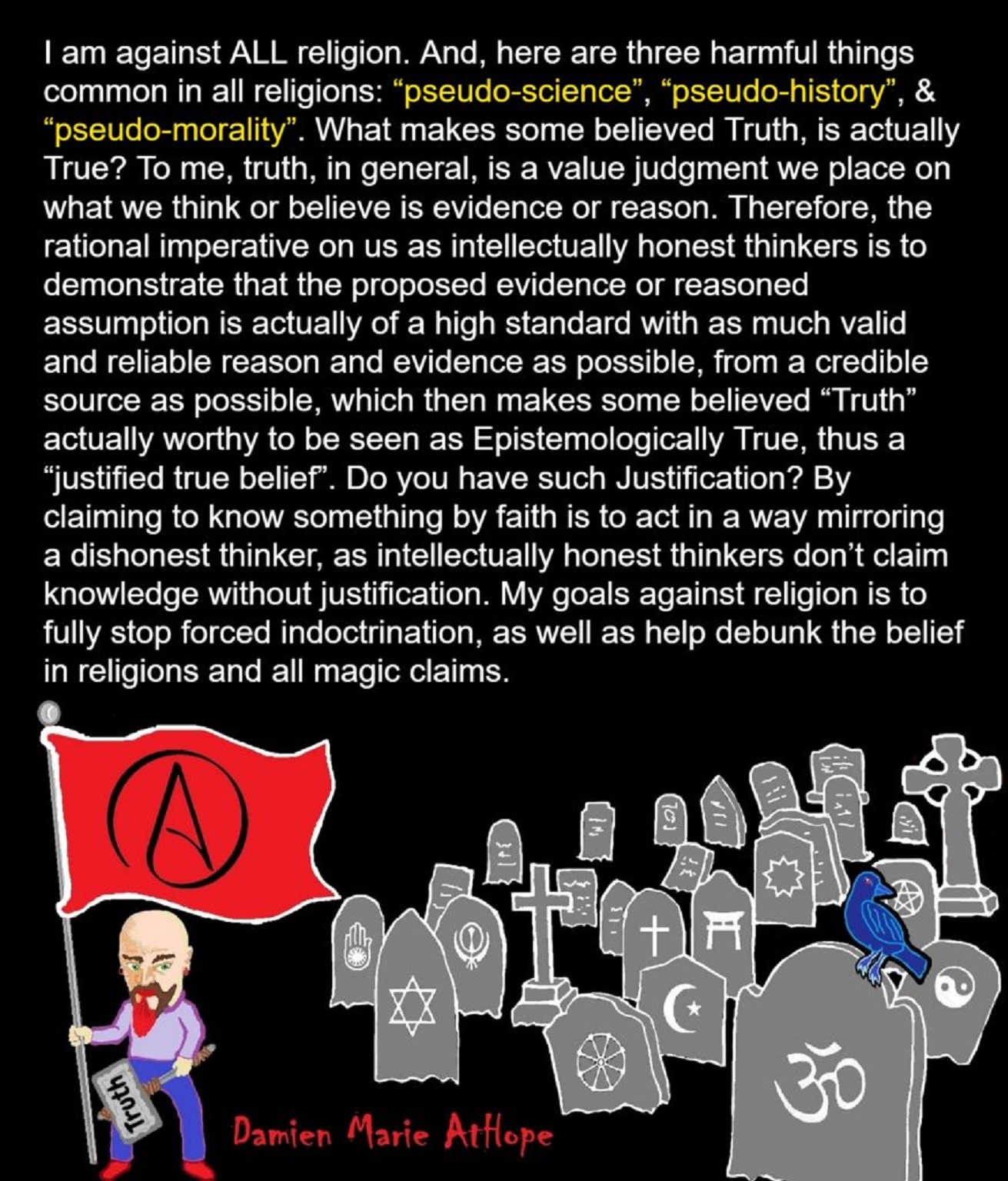Axiological Valuation by Ecological Systems Theorizing
I made this to help others understand how axiology can be applied as I see it. To learn more about Formal Axiology check out this link: https://www.academia.edu/
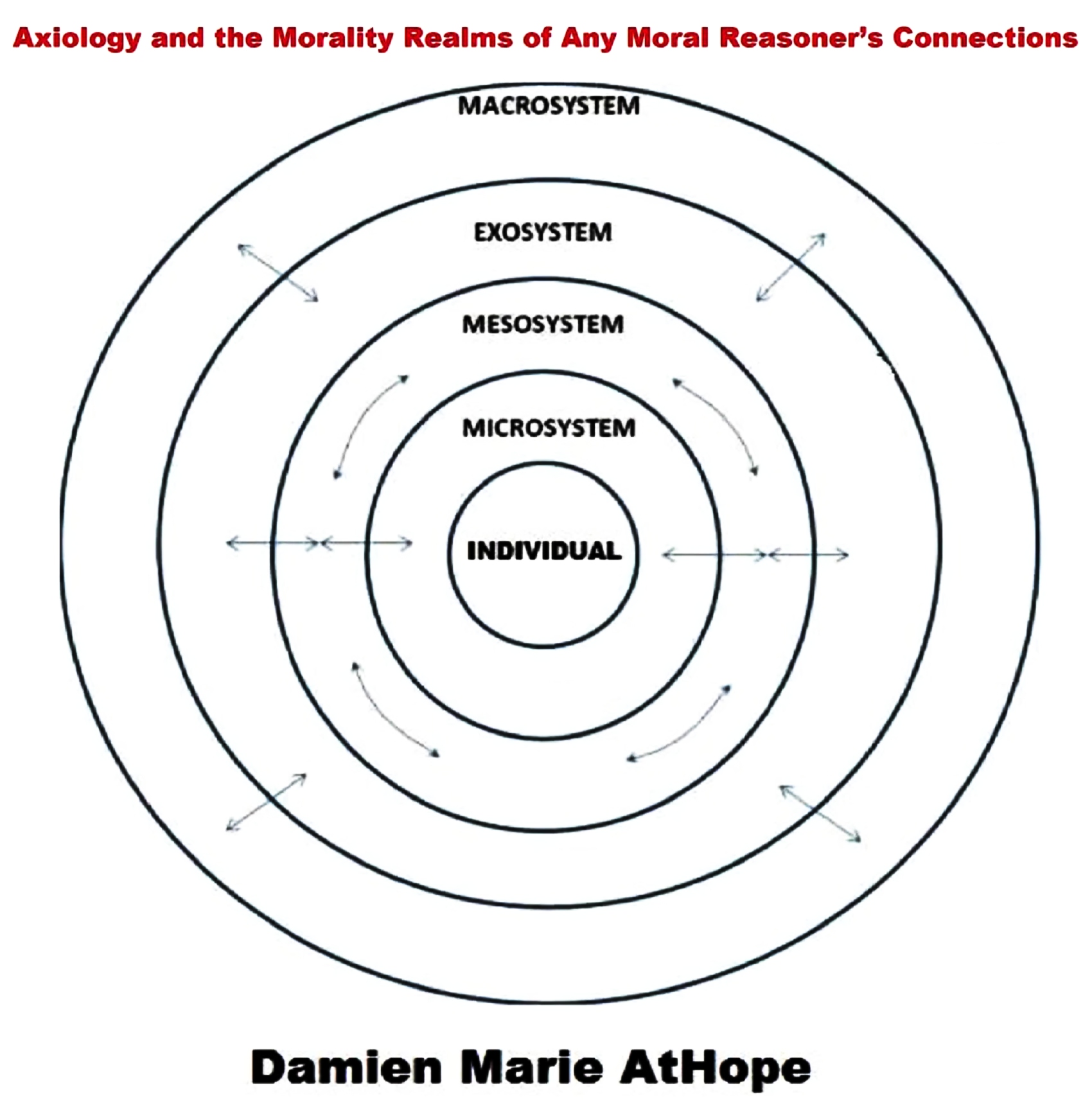
Axiology and the Morality Realms of Any Moral Reasoner’s Connections
Reasoned Axiological thinking on morality realms, of any moral reasoner’s connections, and the moral weight they could motivate or affect in any assessed or concluded valuation, they use in making an ultimate choice of behavior. The axiological Valuation approach to moral decision-making would likely use an Ecological Systems Theory modal. And in order to conceptualize “value” you need to understand the environmental contexts, five ecological systems:
- Individual: Usually highest value, though for some people, family members may have the same or higher value than themself.
- Microsystem: Usually the next highest value is placed with the closest relationships to an individual and encompasses interpersonal relationships and direct interactions with immediate surroundings, for example, family members or friends of friends.
- Mesosystem: Usually includes close to semi-close relationships, for example, family friends or friends of friends.
- Exosystem: Usually only involves things such as semi or not directly involved individuals, for example, people at one’s job, people at places you frequent, then moving out and lessening in assessed value as it goes to further removed or extended networks of connectedness or relatedness. Such as the likely value distinctions in the value of the people in one’s city, the people in one’s state, the people in one’s geographic location, region, and/or county, then their perceived home or chosen country.
- Macrosystem: Usually involving all other people outside their likely value distinctions in the value of the people in one’s city, the people in one’s state, the people in one’s geographic location, region, and/or county, then their perceived home or chosen country. Others not often even acknowledged or if assess generally not as favored as the known. As we seem to hold a tendency to overreact with fear at the different or unknown or even the unfamiliar. What we don’t understand, we come to fear. What we fear we learn to hate and often what we hate we seek to destroy. Thus, for clear thinking and ultimately good acting, we should fight such destructive fear. This area of connectedness relates to its farthest possible extent involving the entire world.
Ecological systems theory
“Ecological systems theory (also called development ‘ relationships within communities and the wider society. The theory is also commonly referred to as the ecological/systems framework. It identifies five environmental systems with which an individual interacts.” ref
- “Microsystem: Refers to the institutions and groups that most immediately and directly impact the child’s development including: family, school, religious institutions, neighborhood, and peers.” ref
- “Mesosystem: Consists of interconnections between the microsystems, for example between the family and teachers or between the child’s peers and the family.” ref
- “Exosystem: Involves links between social settings that do not involve the child. For example, a child’s experience at home may be influenced by their parent’s experiences at work. A parent might receive a promotion that requires more travel, which in turn increases conflict with the other parent resulting in changes in their patterns of interaction with the child.” ref
- “Macrosystem: Describes the overarching culture that influences the developing child, as well as the microsystems and mesosystems embedded in those cultures. Cultural contexts can differ based on geographic location, socioeconomic status, poverty, and ethnicity. Members of a cultural group often share a common identity, heritage, and values. Macrosystems evolve across time and from generation to generation.” ref
- “Chronosystem: Consists of the pattern of environmental events and transitions over the life course, as well as changing socio-historical circumstances. For example, researchers have found that the negative effects of divorce on children often peak in the first year after the divorce. By two years after the divorce, family interaction is less chaotic and more stable. An example of changing sociohistorical circumstances is the increase in opportunities for women to pursue a career during the last thirty years.” ref
“Later work by Bronfenbrenner considered the role of biology in this model as well; thus the theory has sometimes been called the Bioecological model. Per this theoretical construction, each system contains roles, norms, and rules which may shape psychological development. For example, an inner-city family faces many challenges which an affluent family in a gated community does not, and vice versa. The inner-city family is more likely to experience environmental hardships, like crime and squalor. On the other hand, the sheltered family is more likely to lack the nurturing support of extended family.” ref
“Since its publication in 1979, Bronfenbrenner’s major statement of this theory, The Ecology of Human Development has had widespread influence on the way psychologists and others approach the study of human beings and their environments. As a result of his groundbreaking work in human ecology, these environments — from the family to economic and political structures — have come to be viewed as part of the life course from childhood through adulthood.” ref
“Bronfenbrenner has identified Soviet developmental psychologist Lev Vygotsky and German-born psychologist Kurt Lewin as important influences on his theory. Bronfenbrenner’s work provides one of the foundational elements of the ecological counseling perspective, as espoused by Robert K. Conyne, Ellen Cook, and the University of Cincinnati Counseling Program. There are many different theories related to human development. Human ecology theory emphasizes environmental factors as central to development.” ref
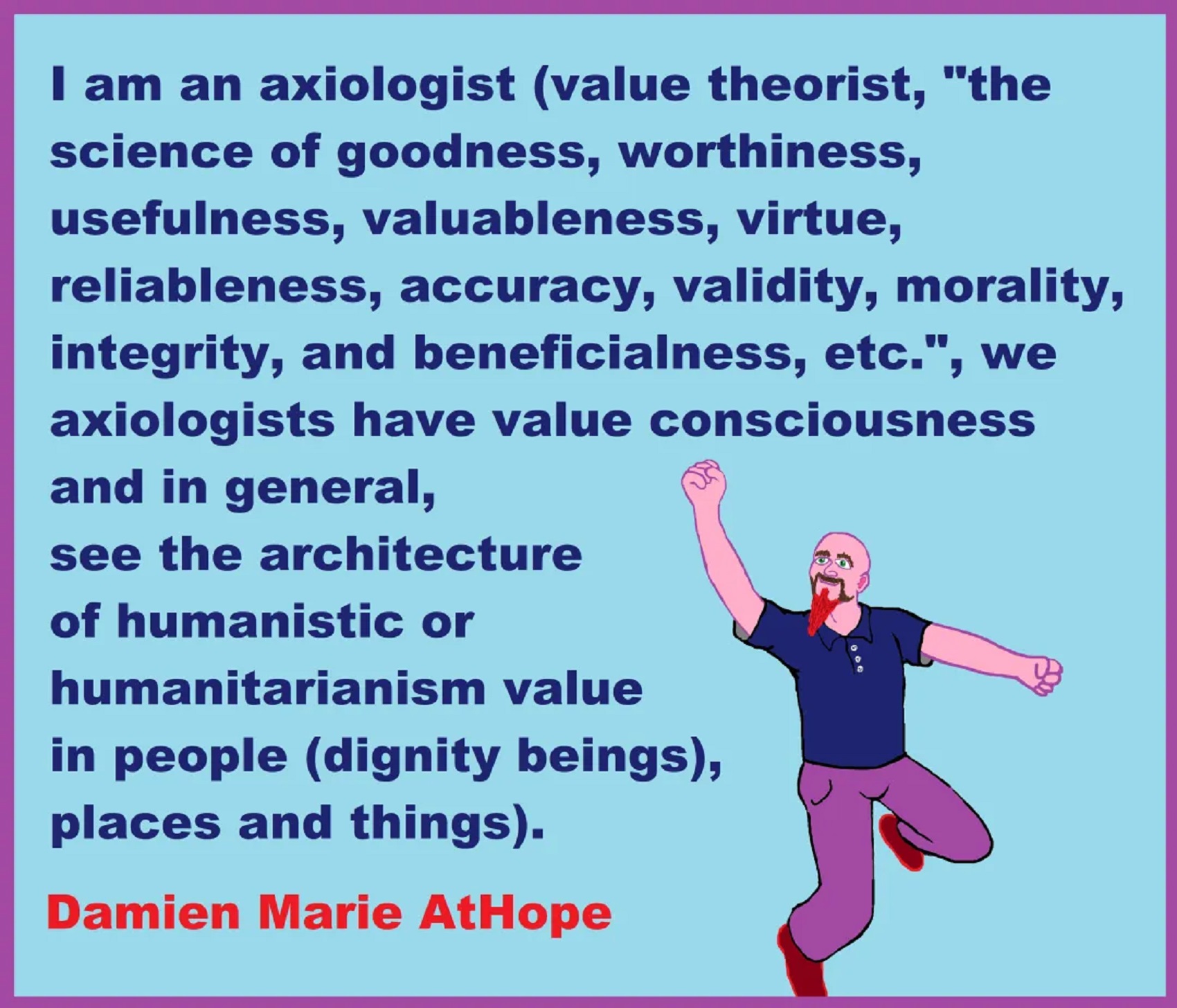
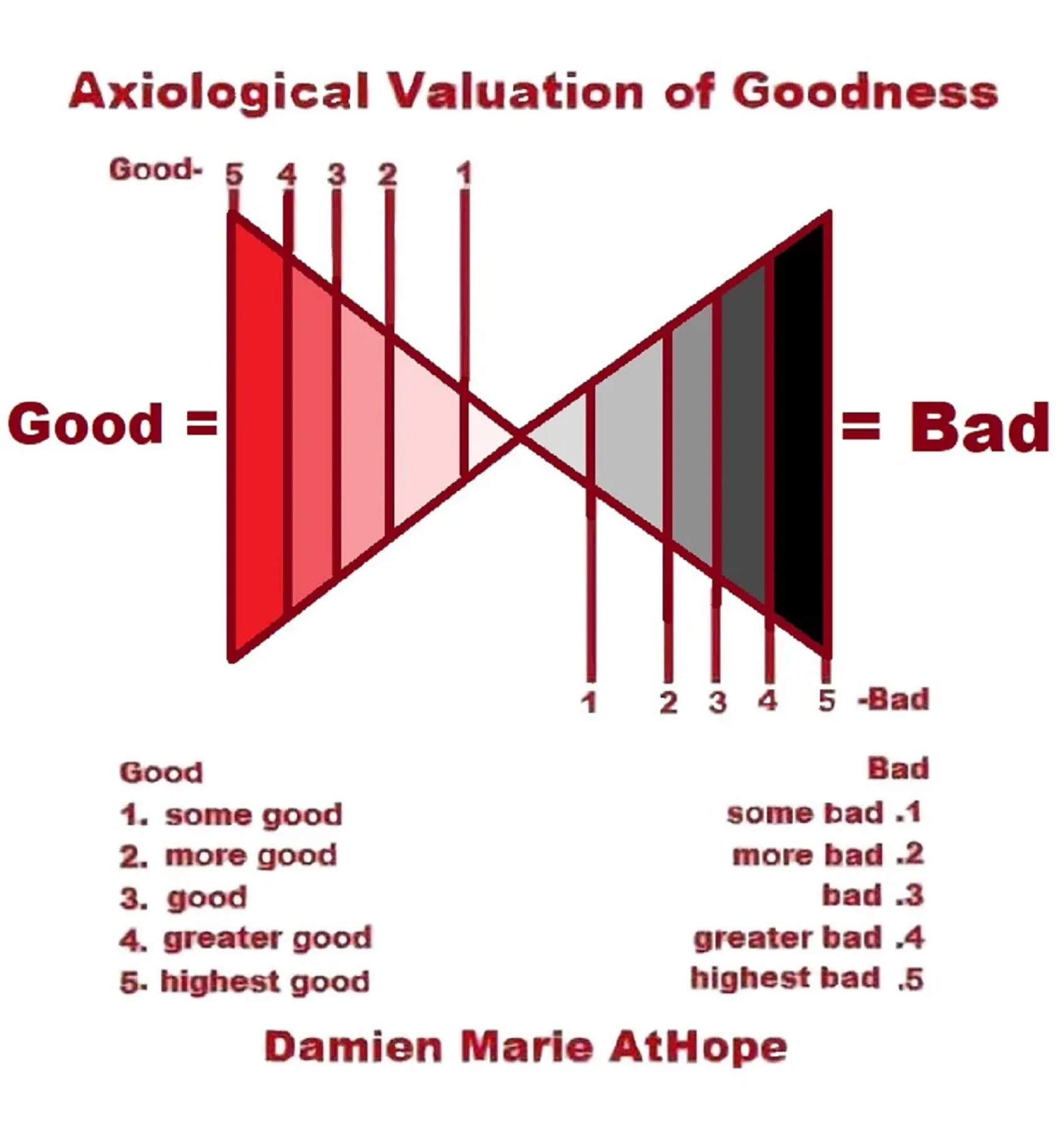
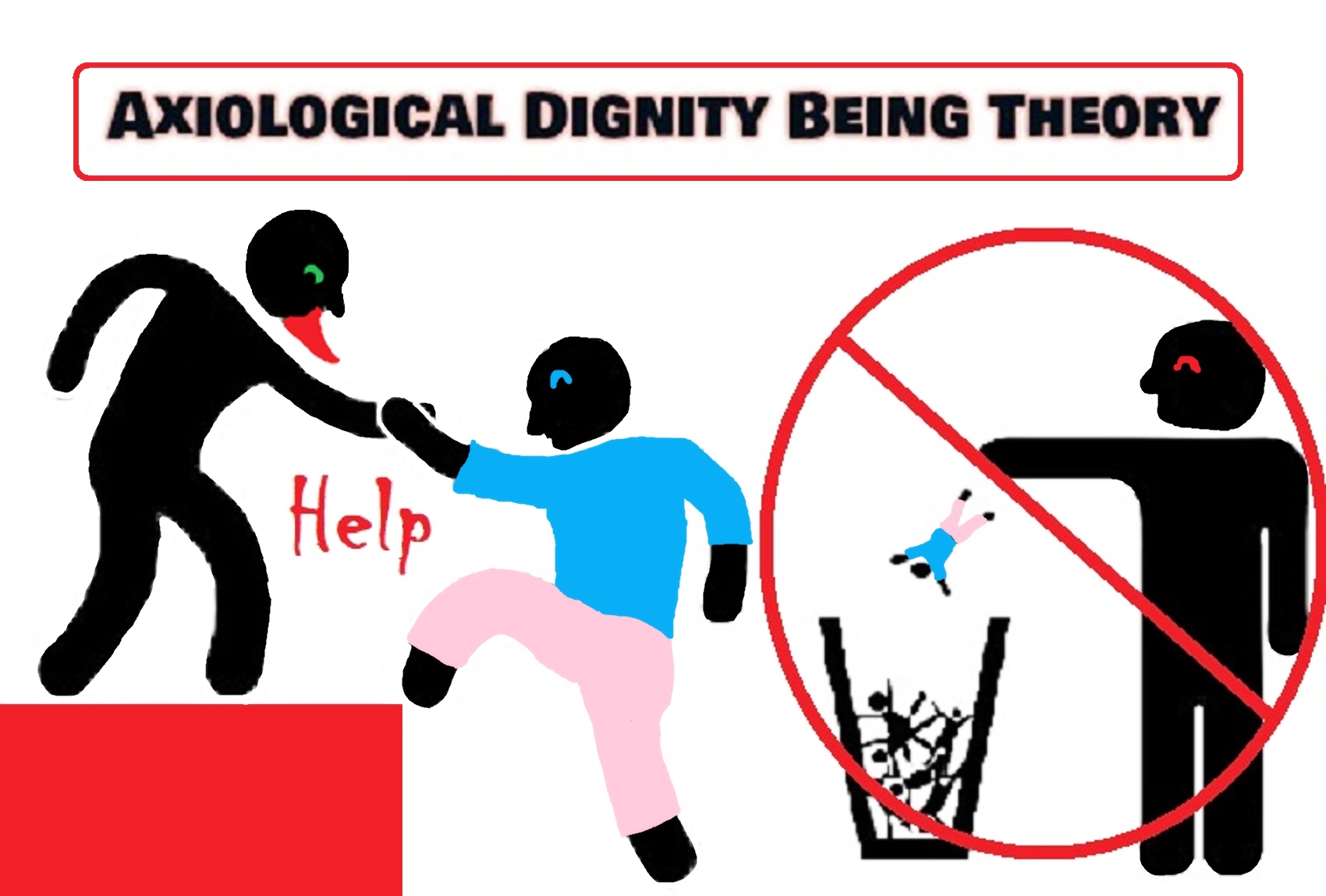
Axiological Valuation of Goodness
I made this to help others understand how axiology can be applied as I see it. To learn more about Formal Axiology check out this link: https://www.academia.edu/
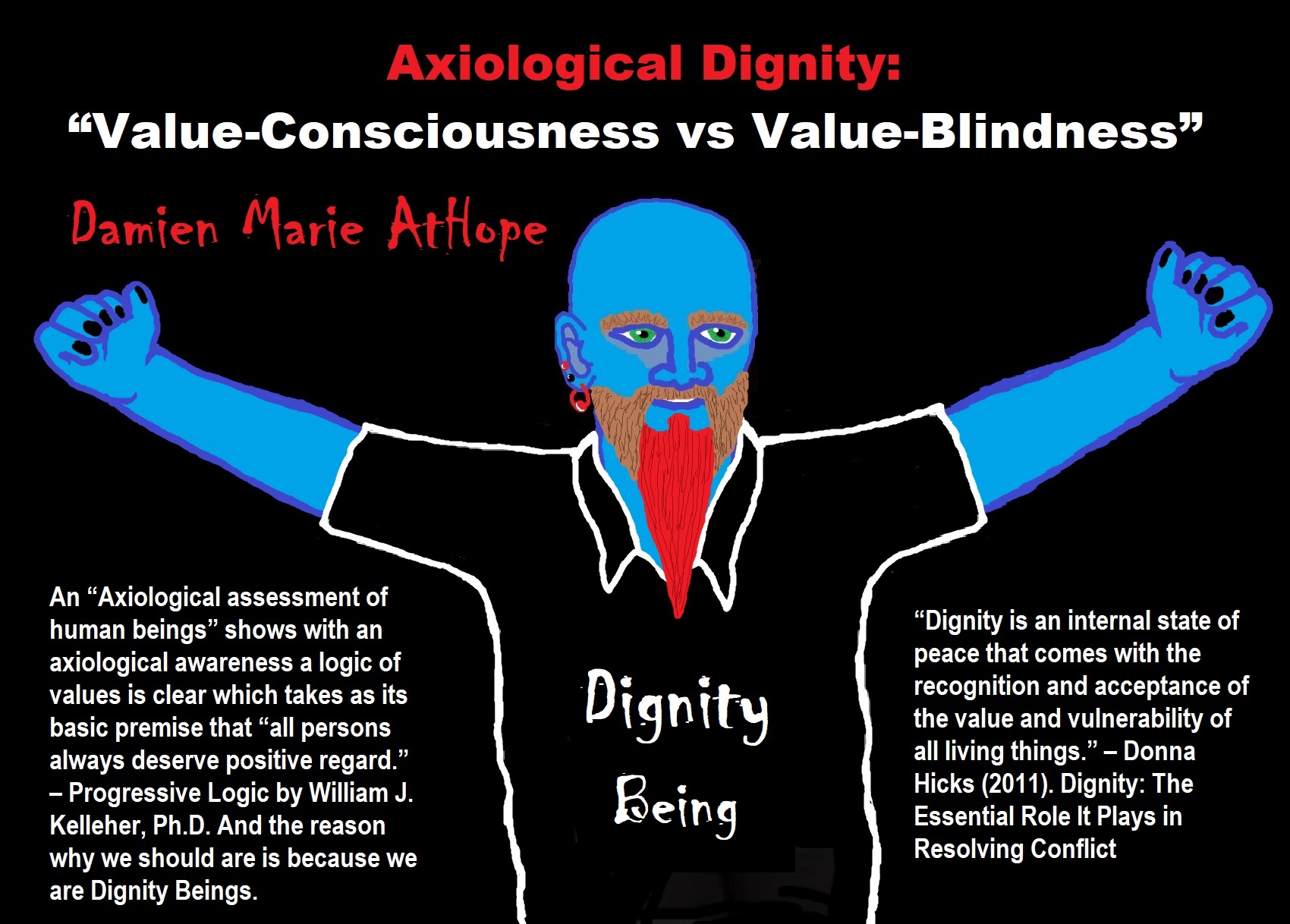
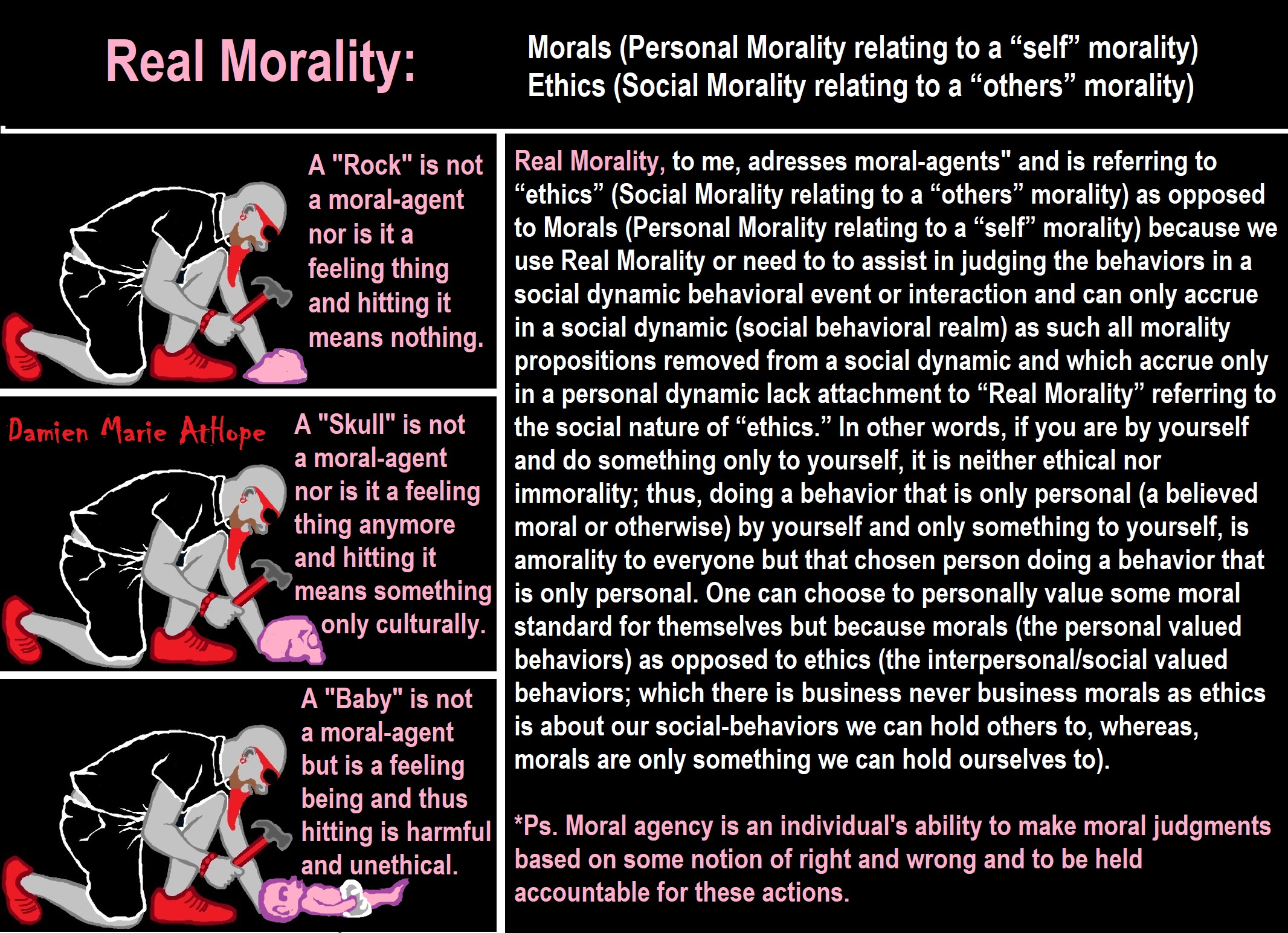
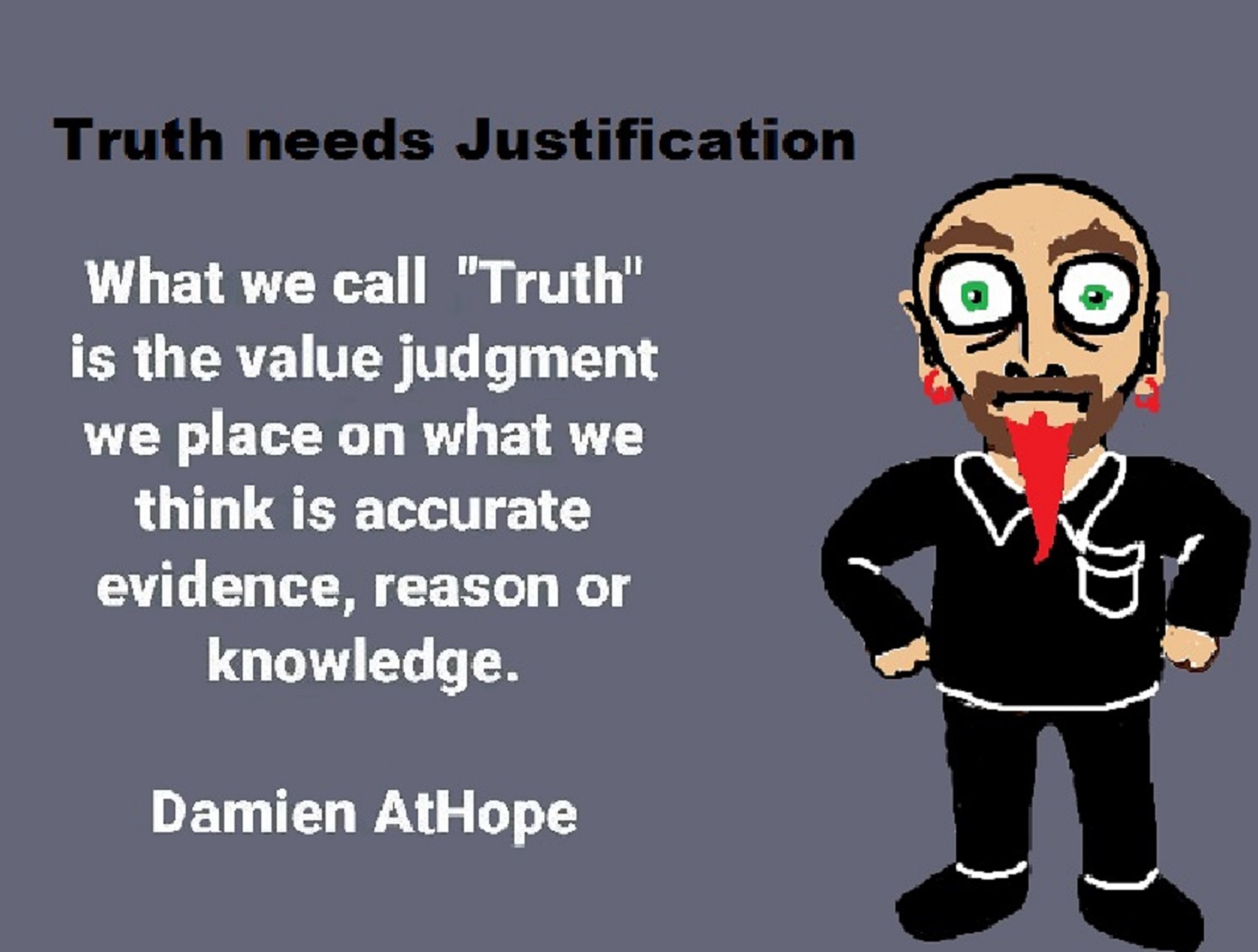
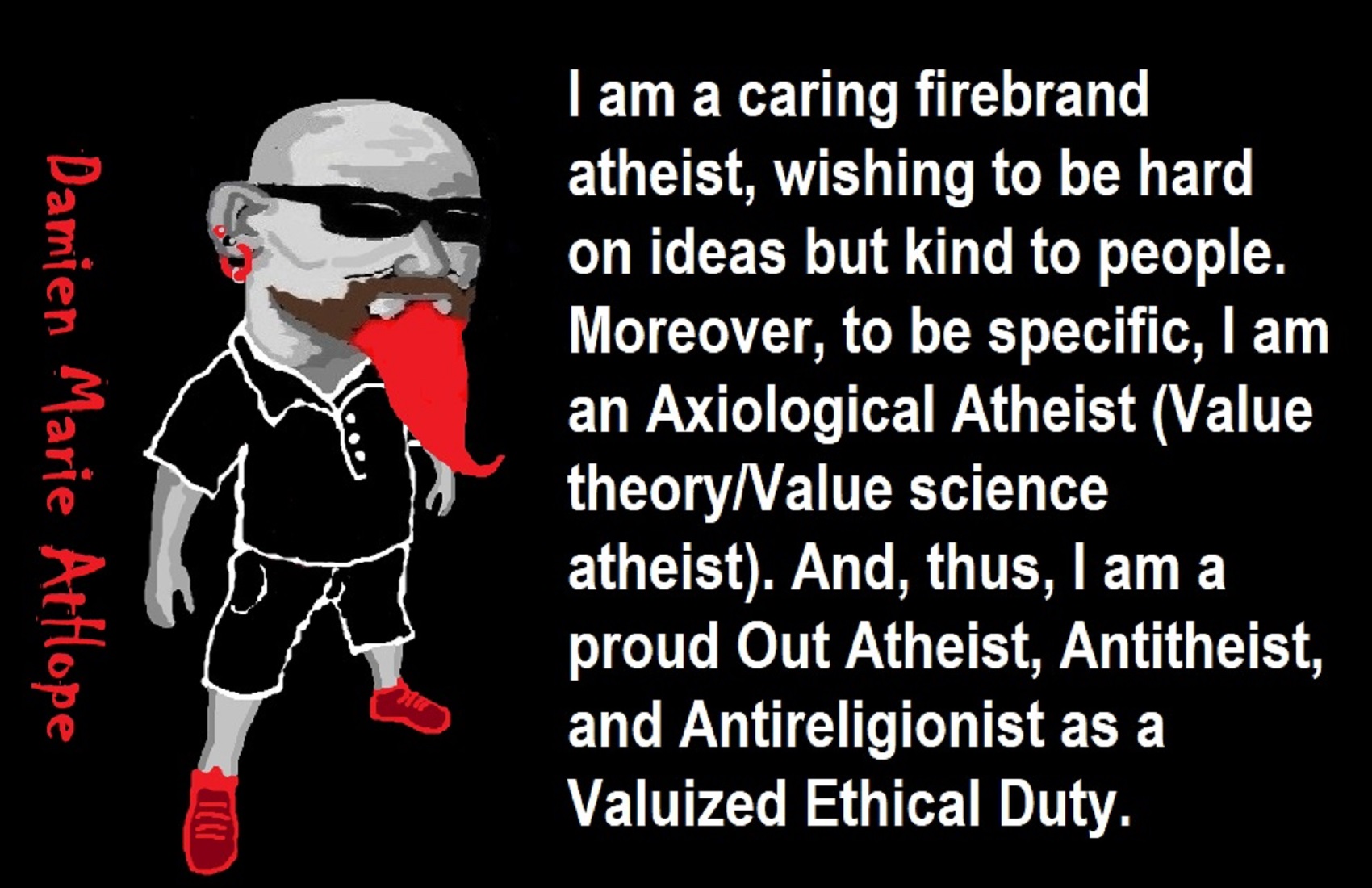
Truth Navigation: Techniques for Discussions or Debates
I do truth navigation, both inquiry questions as well as
strategic facts in a tag team of debate and motivational teaching.
It is just as important to challenge one’s own behavior as to challenge the behavior of others.
I don’t generally assume everyone agrees to the facts and that it is often upon me to help them navigate truth. How can we silently watch as yet another generation is indoctrinated with religious faith, fear, and foolishness? Religion and it’s god myths are like a spiritually transmitted disease of the mind. This infection even once cured holds mental disruption which can linger on for a lifetime. What proof is “faith,” of anything religion claims by faith, as many people have different faith even in the same religion? When you start thinking your “out, atheism, antitheism or antireligionism is not vitally needed just remember all the millions of children being indoctrinated and need our help badly. Ones who desperately need our help with the truth. Three things are common in all religions: “pseudo-science,” “pseudo-history,” and “pseudo-morality.” And my biggest thing of all is the widespread forced indoctrination of children, violating their free choice of what to not believe or believe, I hate forced hereditary religion. Religion and it’s god myths are like a spiritually transmitted disease of the mind. This infection even once cured holds mental disruption which can linger on for a lifetime. I am not the thing abuse made, I am a shooting star blazing bright, shining far pass my past. If you are a religious believer, may I remind you that faith in the acquisition of knowledge is not a valid method worth believing in. Because, what proof is “faith”, of anything religion claims by faith, as many people have different faith even in the same religion? Do you want what is true or want what you believe without concern for what may actually be true?
Don’t let ANGER become an unethical behavior.
I want to make a difference in the world and try to bring hope and new thinking to others where I can. I also wish to champion kindness as often as I champion challenge in thinking and hope for wisdom as much as reason or doubt. I see it is easier to break others down than help them see a way back up. More than just my disbelief in religion and gods or all woo-woo, I hope people get how much I care about humanity and all the different people who are apart of it. We rise by helping each other. May I be thoughtful and care, as well as seek knowledge and share. May we all be good humans to ourselves and others.
I Don’t Have to Respect Ideas
People get confused ideas are not alive nor do they have beingness, Ideas don’t have rights nor the right to even exist only people have such a right. Ideas don’t have dignity nor can they feel violation only people if you attack them personally. Ideas don’t deserve any special anything they have no feelings and cannot be shamed they are open to the most brutal merciless attack and challenge without any protection and deserve none nor will I give them any if they are found wanting in evidence or reason. I will never respect Ideas if they are devoid of merit I only respect people. When I was young it was all about me, I wanted to be liked. Then I got older and it was even more about me, I wanted power. Now I am beyond a toxic ego and it is not just about me, I want to make a difference. Sexism is that evil weed that can sadly grow even in the well-tended garden of the individual with an otherwise developed mind. Which is why it particularly needs to be attacked and exposed; and is why I support feminism. Here are four blogs on that: Activism Labels Matter, thus Feminism is Needed, Feminist atheists as far back as the 1800s?, Sexism in the Major World Religions and Rape, Sexism and Religion?
Having privilege in race, gender, sexuality, ability, class, nationality, etc. does not mean one did not have it hard in life, it just was not hard due to race, gender, sexuality, ability, class, nationality, etc. if one has privilege in that area.
Religion has been a reason for violence and harm and at times a promoter of peace. Science does not need to fill the gap of religion. We need to remove it as it was always an abstraction not a realistic thing to being with. Not one thing religion offers that is thought of as good that cannot be done by persons not following any religion. Atheist generally is simply life with religion removed, all its pseudo meaning as well as pseudoscience, pseudohistory, and pseudo-morality. We have real science, realistic history and can access real morality with a blend of philosophy, anthropology, psychology, sociology and cognitive science.
Empathy: think in another’s thinking, try to feel their feeling, and care about their experience.
Truth Navigation and the fallacy of Fideism “faith-ism”
Hammer of Truth: Yes, you too, have lots of beliefs…
I have made many mistakes in my life but the most common one of all is my being resistant to change. However, now I wish to be more, to be better, as I desire my openness to change if needed, not letting uncomfortable change hold me back. May I be a rationalist, holding fast to a valued belief etiquette: demanding reasoned belief acquisitions, good belief maintenance, and honest belief relinquishment.
A General Thinking in all My Epistemology Theorizing is Justificationism
A general thinking in all “My Ontology, Epistemology, and Axiology theorizing” involves some expression of Justificationism. As in, I require a worthy argument, that is justified with a good warrant(s), quality rich with valid and reliable reason and evidence that is connected to the accuracy of the truth claimed.
Trying to Help Promote Knowledge: Philosophy and Science.
Dogmatic–Propaganda vs. Disciplined-Rationality
I am a BIG fan of the truth.
Religion should be seen as ancient mythology to be marveled and laughed at, rather than promoted as truth when it is only feeble pseudo-truth.
And why do we so often error it thinking to wish on myths and not believe in scientific proven “godless-reality”, is because We are emotional beings who have a thinking strategy called reason we only sometimes use. Simply, We are not rational beings who have a bonding strategy called emotions we sometimes use. Atheists talk about gods and religions for the same reason doctors talk about cancer, they are looking for a cure or a firefighter talking about fires because they burn people and they care to stop them. We atheists too often feel a need to help the victim’s of mental slavery, held in the bondage that is the false beliefs of gods and the conspiracy theories of reality found in religions.
Belief-Etiquette
I value good Belief-Etiquette: reasoned belief-acquisitions, good belief-maintenance, and honest belief relinquishment. I am first always a rationalist, as reason is my only master. May I always be a truth seeker and not a blind faith believer. Thinking is good and one claiming otherwise is indeed a person erroring in reason. Which may I remind you is terrible since the most Base Presupposition in our understanding of everything begins in reason.
I am against ALL religion. And, here are three harmful things common in all religions: “pseudo-science”, “pseudo-history”, & “pseudo-morality”. What makes some believed Truth, is actually True? To me, truth, in general, is a value judgment we place on what we think or believe is evidence or reason. Therefore, the rational imperative on us as intellectually honest thinkers is to demonstrate that the proposed evidence or reasoned assumption is actually of a high standard with as much valid and reliable reason and evidence as possible, from a credible source as possible, which then makes some believed “Truth” actually worthy to be seen as Epistemologically True, thus a “justified true belief”. Do you have such Justification? By claiming to know something by faith is to act in a way mirroring a dishonest thinker, as intellectually honest thinkers don’t claim knowledge without justification. My goals against religion is to fully stop forced indoctrination, as well as help debunk the belief in religions and all magic claims. I have justification to claim to know what I claim to know, that is proof, not faith which is unproof “Unjustified Belief.” Again do you really have such Justification for all your beliefs? My main goal against religion is to fully stop as much as possible forced indoctrination, one could ask but then why do I challenge all adults faith? well, who do you think is doing the lying to children in the first place. End Hereditary religion, if it’s a BELIEF, let a child have the equal “self-chosen” right to choose to believe freely.
“Sound thinking to me, in a general way, is thinking, reasoning, or belief that tends to make foresight a desire to be as accurate as one can with valid and reliable reason and evidence.”
Sound axiological judgment, to me, a “presumptive-value” success, is value judged opinions expressed as facts with a valid and reliable justification. In an informal and psychological sense, it is used in reference to the quality of cognitive faculties and adjudicational (relating to adjudication) capabilities of particular individuals, typically called wisdom or discernment. In a legal sense, – used in the context of a legal trial, to refer to a final finding, statement, or ruling, based on a considered weighing of evidence, called, “adjudication“.
A Sound Thinker: uses disciplined rationality
A Shallow Thinker: undisciplined, situational, sporadic, or limited thinking.
Compare ideas not people, attack thinking and not people. In this way, we have a higher chance to promote change because it’s the thinking we can help change if we address the thinking and don’t attack them.
My eclectic set of tools for my style I call “Truth Navigation” (Techniques for Discussions or Debates) which involves:
*REMS: reason (rationalism), evidence (empiricism), and methodological “truth-seeking” skepticism (Methodic doubt) (the basic or general approach)
*The Hammer of Truth: ontology, epistemology, and axiology (methodological use of philosophy)
*Dialectical Rhetoric = truth persuasion: use of facts and reasoning (motivational teaching)
*Utilizing Dignity: strategic dignity attacks or dignity enrichments (only used if confusion happens or resistance is present)
Asking the right questions at the right time with the right info can also change minds, you can’t just use facts all on their own. Denial likes consistency, the pattern of thinking cannot vary from a fixed standard of thinking, or the risk of truth could slip in. Helping people alter skewed thinking is indeed a large task but most definitely a worthy endeavor. Some of my ideas are because I am educated both some in college (BA in Psychology with addiction treatment, sociology, and a little teaching and criminology) and also as an autodidact I have become somewhat educated in philosophy, science, archeology, anthropology, and history but this is not the only reason for all my ideas. It is also because I am a deep thinker, just striving for truth. Moreover, I am a seeker of truth and a lover of that which is true.
May I not be a silent watcher as millions of children are subjugated almost before their birth let alone when they can understand thought and are forcibly coerced, compelled, constrained, and indoctrinated in the mental pollution that religion can be.
*REMS: reason (rationalism), evidence (empiricism), and methodological “truth-seeking” skepticism (Methodic doubt) (the basic or general approach)
My “Methodological Rationalism” approach: (REMS) Reason, Evidence & Methodological Skepticism
We don’t really defend atheism, to me as much as present reason and evidence to why theism is unjustified, unwarranted and found baseless to the point that atheism is almost like a default conclusion; it is reasonable when the belief proposition of theism fails as it always will. I have been told that me challenging or correcting people’s religious falsehoods was harmful. I say, “what”, ((sarcastically)) then responded, “yes”, just like challenging or correcting people’s lies is harmful…. Well, ok it’s harmful to falsehoods keeping their unjustified persuasive power.
My style when doing atheist outreach is basically to challenge with valid and reliable reason and evidence with a “reflective equilibrium” to what appears to be, has some high likelihood of being or has some strong confirmation.
The rationale of why reason is first is because if you can’t reason with them and at times this is obviously a factor with some people, just stop as all things revolve around reason. Thus, roughly stated as rationalism (which for me is reasonable use or application of things in philosophy methods or tools like reason, logic, axiology, ontology and epistemology, etc.), and empiricism (which for me is reasonable use or application of things in philosophy methods or tools like evidence ie. facts like science, history, and archeology, etc.) as well as navigating all this with “methodological skepticism” instead of (Philosophical skepticism) which is an approach that subjects all knowledge claims to scrutiny with the goal of sorting out true from false claims.
Religion and Science are Completely Different Epistemologies
Rationalist through and through
To me, when assessing belief, one should think about the Correspondence Theory of Truth and Justificationism:
A General Thinking in all My Epistemology Theorizing is Justificationism
I like Justificationism to analyze beliefs or statements if they are true even more than Correspondence theories. People may think or analyze in a similar way without knowing the term or the method as it is reasonable and uses thinking that could be equally reached by critical thinking just like that in Correspondence theories. The difference is having a go-to standard like Correspondence theories or Justificationism helps clarify thinking quickly with a higher accuracy than randomly trying to employ critical thinking alone. Moreover, as a general thinking in all my epistemology is Justificationism:(philosophy) an approach that regards the justification of a claim as primary, while the claim itself is secondary; thus, criticism consists of trying to show that a claim cannot be reduced to the authority or criteria that it appeals to. “Theory of justification is a part of epistemology that attempts to understand the justification of propositions and beliefs. Epistemologists are concerned with various epistemic features of belief, which include the ideas of justification, warrant, rationality, and probability. Loosely speaking, justification is the reason that someone (properly) holds a belief. When a claim is in doubt, justification can be used to support the claim and reduce or remove the doubt. Justification can use empiricism (the evidence of the senses), authoritative testimony (the appeal to criteria and authority), or logical deduction.” Ref In a general way, “Justificationism” is the presupposition that claims to knowledge must be authenticated, certified, verified, validated, confirmed, proven, corroborated, back up, show to be accurate, confirmed or in some other way shown to be justified. In other words, if a belief is knowledge, then it is in some way justified, and if a belief is unjustified then it is not knowledge. Justificationism” is the presupposition that claims to knowledge are on trial and the desire is make sure or demonstrate that (something) is true, thus in a Justificationism presupposition inquiry any claim to knowledge can be analyzed, for value by asking for its justification, and failure to provide sufficient justification is enough to reject that claim to knowledge until adequate justification is provided. In this context, a rational ethical belief (Ethics of Belief), is one which is justified, and a rational person is one who provides a rational ethical belief, with good reasons or proof to justify what is believed. For a justificationist, the purpose of philosophical investigation is not a search for faith (unjustified) belief, but only a search for justified true belief. This difference is subtle but important: while a justified belief is always rationally justified as true, it still must be realized that an unjustified belief is not necessarily always false but indeed is not justified. Failure to provide sufficient justification is enough to reject an offered claim to knowledge as unjustified belief (faith: belief without evidence or belief even up against contradictory evidence). These presuppositions constitute a reinforced justificationism, which uses and defines the rules by which competing proposals are evaluated, it can ensure any attempt to introduce faith (unjustified) belief(s) can be dismissed as unjustified. I don’t have trust issues it’s just from experience I know many beliefs are full of shit thus lack any good justifacation. I am 100 % psychologically sure not you nor anyone can honestly justify their claim of knowing even the concept of gods, if one like me simply demands a valid and reliable ontology of the term god. I see no honesty is saying that god anything as not one person can truly even say what it is and defiantly can offer no valid justification for the thinking either the concept of gods is a thinking error period. You have no ontology of god as you have not validated the term to mean anything but myths or confusions. Provide a support to even claim what a god could or could not be then validated hoe you know this and why it is valid and reasonable or as I already know, no one honestly can they must intellectually lie or be so under confusion they can’t think clear to do so. What is this god whatever you are supposedly agnostic about? if you don’t know then you don’t have something to doubt rather you are holding open a thinking error possibility from some myth others invented without reason as if it was reason. The concept of gods begins with a faulty presupposition of an unsound thinker who has failed to demand justification an simply accepts the absurd. Reason is my only master, whereas faith offered as reality is most defiantly not my friend.
(REMS) Reason, Evidence & Methodological Skepticism
Folk Logic: YOU CAN’T PROVE A NEGATIVE because you can PROVE A NEGATIVE
We don’t really defend atheism, to me as much as present reason and evidence to why theism is unjustified, unwarranted and found baseless to the point that atheism is almost like a default conclusion; it is reasonable when the belief proposition of theism fails as it always will. I have been told that me challenging or correcting people’s religious falsehoods was harmful. I say, “what”, ((sarcastically)) then responded, “yes”, just like challenging or correcting people’s lies is harmful…. Well, ok it’s harmful to falsehoods keeping their unjustified persuasive power.
My style when doing atheist outreach is basically to challenge with valid and reliable reason and evidence with a “reflective equilibrium” to what appears to be, has some high likelihood of being or has some strong confirmation.
The rationale of why reason is first is because if you can’t reason with them and at times this is obviously a factor with some people, just stop as all things revolve around reason. Thus, roughly stated as rationalism (which for me is reasonable use or application of things in philosophy methods or tools like Reason “rationalism” tools: ontology, epistemology, and axiology, etc.), and Evidence “empiricism” tools: (which for me is reasonable use or application of things in philosophy methods or tools like evidence ie. facts like science, history, and archeology, etc.) as well as navigating all this with “methodological skepticism” instead of (Philosophical skepticism) which is an approach that subjects all knowledge claims to scrutiny with the goal of sorting out true from false claims.
Legal burden of proof and Philosophic burden of proof: Understanding and utilizing evidence and evidence critique. There is a common need to grasp the issues surrounding “evidence”, deconstructing evidence-based claims and the pathways in thinking needed to control what is offered or accepted as evidence, is it really even evidence or does it matter to supporting an assertion.?Evidence, broadly construed, is anything presented in support of an assertion. This support may be strong or weak. The strongest type of evidence is that which provides direct proof of the truth of an assertion. At the other extreme is evidence that is merely consistent with an assertion but does not rule out other, contradictory assertions, as in circumstantial evidence. In law, rules of evidence govern the types of evidence that are admissible in a legal proceeding. Types of legal evidence include testimony, documentary evidence, and physical evidence. The parts of a legal case which are not in controversy are known, in general, as the “facts of the case.” Beyond any facts that are undisputed, a judge or jury is usually tasked with being a trier of fact for the other issues of a case. Evidence and rules are used to decide questions of fact that are disputed, some of which may be determined by the legal burden of proof relevant to the case. Evidence in certain cases (e.g. capital crimes) must be more compelling than in other situations (e.g. minor civil disputes), which drastically affects the quality and quantity of evidence necessary to decide a case. Scientific evidence consists of observations and experimental results that serve to support, refute, or modify a scientific hypothesis or theory, when collected and interpreted in accordance with the scientific method. In philosophy, the study of evidence is closely tied to epistemology, which considers the nature of knowledge and how it can be acquired. The burden of proof is the obligation of a party in an argument or dispute to provide sufficient evidence to shift the other party’s or a third party’s belief from their initial position. The burden of proof must be fulfilled by both establishing confirming evidence and negating oppositional evidence. Conclusions drawn from evidence may be subject to criticism based on a perceived failure to fulfill the burden of proof. Two principal considerations are: 1) On whom does the burden of proof rest? Or 2) To what degree of certitude must the assertion be supported? The latter question depends on the nature of the point under contention and determines the quantity and quality of evidence required to meet the burden of proof. In epistemology, the burden of proof (Latin: onus probandi (shorthand for Onus probandi incumbit ei qui dicit, non ei qui negat)) is the obligation on a party in a dispute to provide sufficient warrant for their position. Holder of the burden: When two parties are in a discussion and one asserts a claim that the other disputes, the one who asserts has a burden of proof to justify or substantiate that claim. An argument from ignorance occurs when either a proposition is assumed to be true because it has not yet been proved false or a proposition is assumed to be false because it has not yet been proved true. This has the effect of shifting the burden of proof to the person criticizing the proposition. While certain kinds of arguments, such as logical syllogisms, require mathematical or strictly logical proofs, the standard for evidence to meet the burden of proof is usually determined by context and community standards and conventions. In public discourse: Burden of proof is also an important concept in the public arena of ideas. Once participants in discourse establish common assumptions, the mechanism of the burden of proof helps to ensure that all parties contribute productively, using relevant arguments. Proving a negative: A negative claim is a colloquialism for an affirmative claim that asserts the non-existence or exclusion of something. There are many proofs that substantiate negative claims in mathematics, science, and economics including Arrow’s impossibility theorem. A negative claim may or may not exist as a counterpoint to a previous claim. A proof of impossibility or an evidence of absence argument are typical methods to fulfill the burden of proof for a negative claim. Example: Atheist internet personality Matt Dillahunty gives the example of a large jar full of gumballs to illustrate the burden of proof. The number of whole gumballs in the jar is either even or odd, but the degree of personal acceptance or rejection of claims about that characteristic may vary. We can choose to consider two claims about the situation, given as: 1. The number of gumballs is even. or 2. The number of gumballs is odd. Either claim could be explored separately; however, both claims represent the same proposition and do in fact ask the same question. Odd in this case means “not even” and could be described as a negative claim. Before we have any information about the number of gumballs, we have no means of checking either of the two claims. When we have no evidence to resolve the proposition, we may suspend judgment. From a cognitive sense, when no personal preference toward opposing claims exists, one may be either skeptical of both claims or ambivalent of both claims. If there is a claim proposed and that claim is disputed, the burden of proof falls onto the proponent of the claim. If there is no agreeably adequate evidence to support a claim, the claim could be considered to be an argument from ignorance. Ref, Ref Rationalism is any view appealing to intellectual and deductive reason (as opposed to sensory experience or any religious teachings) as the source of knowledge or justification. I personally lean to a type of modern rationalism similar to what was held during the middle of the 20th Century where there was a strong tradition of organized Rationalism (represented in Britain by the Rationalist Press Association, for example), which was particularly influenced by free thinkers and intellectuals.
However, Rationalism in this sense has little in common with traditional Continental Rationalism, and is marked more by a reliance on empirical science. It accepted the supremacy of reason but insisted that the results be verifiable by experience and independent of all arbitrary assumptions or authority. (1)
Rationalism, since the Enlightenment, historically emphasized a “politics of reason” centered upon rational choice,utilitarianism, secularism, and irreligion – the latter aspect’s antitheism later ameliorated by utilitarian adoption of pluralistic rationalist methods practicable regardless of religious or irreligious ideology. In this regard, rationalism, as a methodology, became socially conflated with atheism, In the past, particularly in the 17th and 18th centuries, the term ‘rationalist’ was often used to refer to free thinkers of an anti-clerical and anti-religious outlook. The use of the label ‘rationalist’ to characterize a world outlook which has no place for the supernatural is becoming less popular today; terms like ‘humanist‘ or ‘materialist‘ seem largely to have taken its place.(2)
Moreover, both rationalism and empiricism are known as two major approaches to natural philosophy. Empiricism involved the method of inductive reasoning, which was applied on experience, including observation and experimentation. Rationalism, while not discounting induction entirely, maintained that deductive reasoning was the means to establish true knowledge. Deduction is reasoning from given premises to necessary conclusions. (3)
The modern scientific method synthesizes rationalism and empiricism. The logic of the rationalist is combined with the observational experience of the empiricist. There is an overwhelming consensus, though, that empiricism is the main emphasis. No matter how much logical deduction and mathematical analysis is used, at some point, the world must be checked for the confirmation of a belief. The modern scientific method synthesizes rationalism and empiricism. The logic of the rationalist is combined with the observational experience of the empiricist. There is an overwhelming consensus, though, that empiricism is the main emphasis. No matter how much logical deduction and mathematical analysis is used, at some point, the world must be checked for the confirmation of a belief. Historically, however, spurred on by the power of mathematics and the tendency to conclude that we know something even though complete empirical observations are not available, rationalism has played both a constructive and creative role in the development of science.
The criticism of those who are too rationalistic and who create ivory-tower fantasies from speculative logic, overlooks the fact that many great discoveries have been made by scientists sitting at desks or standing in front of chalkboards. It is difficult for many people today to imagine that the Earth is moving and not the Sun. We do not experience ourselves moving at 1,000 miles per hour; instead we “observe” the Sun to move. That a belief is inconsistent with our common observational experience is not by itself a conclusive argument that it is false. Empirical scientists do believe in the ability of the human mind to figure things out. Any fundamental inconsistency between common sense and reason is seen as nature’s way of taunting us, of revealing one of her important secrets. The confidence in the logical and mathematical powers of human thinking has been a key ingredient in the development of modern science. “Theory Must Agree With Reality” (4)
Radical skepticism cannot be reasonable, we should nonetheless take his method seriously enough that we remain diffident in our judgments – that we not take things dogmatically, but rather critically, ready to recognize evidence that can challenge the rational acceptability of those judgments. So long as we do not take ‘clear’ and ‘distinct’ as rigidly, it is not a bad rule to include nothing more in one’s judgments than what presents itself to one’s mind so clearly and distinctly that one has no reason to doubt it. This is what reasonable persons do, too many it is now the norm. (5)
A question to believers: “if your religion was false would you want to know about it?” If you’re sure of your response is that truly coming from a place of open honesty. We must never forget that just because an idea or belief has mass approval or a wide acceptance, this tells nothing of its truth status, its accuracy, or any provable validity.
The Rational Imperative, How Does One Know Things?
I am aggressive with ideas, but I am kind to people. My motto is attack thinking, not people. I do not respect religion, but I respect people. I do not believe in religion as it has a high potential for bad, but I believe in the potential for good in people. That is my style as a Firebrand Atheist that is a Humanistic Person.
My Atheist Activism Acknowledged in College Paper: Link
I often say to believers on the street, no, you don’t believe in god or religion. What you do or did was were told, (most often by family) this is what you need to believe or this is what we believe and you say ok, only after that as an adult, (especially when challenged) you try to support this post-acceptance commitment as if it has a rationalization. You are attempting to support that you did not choose wrong overlooking any faults or defects in order to feel justified and the psychological desire to stay consistent with that commitment.
So, what you likely have now is a kind of Post-purchase rationalization. Which is also known as Buyer’s Stockholm Syndrome, a cognitive bias whereby someone who has purchased an expensive product or service overlooks any faults or defects in order to justify their purchase. It is a special case of choice-supportive bias. This rationalization is based on the Principle of Commitment and the psychological desire to stay consistent with that commitment. (6)
I am a rationalist who uses methodological skepticism and also may utilize scientific skepticism. Methodological skepticism is a way of using the process of doubting in order to arrive at certainty. And scientific skepticism is the practice of questioning whether claims are supported by empirical research and have reproducibility, as part of a methodological norm pursuing “the extension of certified knowledge” Some people who doubt what is rational or proven say they are skeptics or being skeptical they are denialists or possibly using philosophic skepticism. Philosophical skepticism is distinguished from methodological skepticism in that philosophical skepticism is an approach that questions the possibility of certainty in knowledge. Whereas methodological skepticism is an approach that subjects all knowledge claims to scrutiny with the goal of sorting out true from false claims. Methodological skepticism, is a systematic process of being skeptical about (or doubting) the truth of one’s beliefs, it is similar to scientific skepticism. Likewise, scientific skepticism is different from philosophical skepticism, which questions our ability to claim any knowledge about the nature of the world and how we perceive it. Scientific skeptics believe that empirical investigation of reality leads to the truth, and that the scientific method is best suited to this purpose. Scientific skeptics attempt to evaluate claims based on verifiability, reliability, and often adhering to falsifiability discouraging acceptance of claims on faith or anecdotal evidence. There does seem to be a lot of improper use of the term skeptic attached to conspiracy theories and denialism. In human behavior, denialism is exhibited by individuals choosing to deny reality as a way to avoid dealing with an uncomfortable truth. Then again, I have skepticism for “extreme philosophical skepticism or universal skepticism philosophy”. Radical skepticism about the external world is the idea that we cannot have accurate knowledge about the physical world outside of our minds. That idea, if true, would block the truth-seeker’s attempt to gain knowledge by assessing the natural world. Sure, reasonable skepticism gets us to a good solid starting point to remove flawed beliefs but there is a need to move beyond skepticism if it removes any sureness of things that are actually demonstrative as true then to me it can become pseudo-skeptic and denialist thinking. Granted I do think all claims or beliefs we think are true should be open to challenge and reassessment and if found wanting, corrected or abandoned. Scientific skepticism is also called rational skepticism, and it is sometimes referred to as skeptical inquiry. I see philosophy as a set of tools, some are viral, some not needed as much but still useful, other not very useful but still needed and others just some gimmick people were conned into buying that is entirely unusual and even harmful. I am not anti-skeptical or anti-skeptic it is just not the accurate label for my thinking. if the term “Skeptic” was limited to only methodological skepticism I would champion the term as well. I think skeptic should automatically infer the methodological skepticism approach and likewise, denialist thinking should not be seen as a true philosophical approach to skepticism as there is a difference between a skeptic and denialist. Denialist “pseudo-skeptics” are often religionists, magical thinkers, conspiracy theorist, supporters of woo-woo, and other whackjobs these days. Religion and other magical thinking woo-woo distorts reality. How can we expect people to make rational decisions when they believe in non-reality as if it is reality? Reasonable skepticism to me is or should be more about the process of applying reason and critical thinking to determine validity or reliable reason or evidence. It’s the process of finding a supported conclusion, not the justification of a preconceived conclusion. 1, 2, 3, 4
Rationalism, Freethinker, Humanism & Secular humanism?
I am a am a rationalist, freethinker, humanist and a secularist.
*Rationalism is a philosophy in which a high regard is given to reason (specifically logic) and to empirical observation.
*Freethinker a person who forms his or her own opinions about important subjects (such as religion and politics) instead of accepting what other people say.
*Humanism is a philosophical and ethical stance that emphasizes the value and agency of human beings, individually and collectively, and generally prefers critical thinking and evidence (rationalism, empiricism) over established doctrine or faith (fideism).
*Secular humanism is a comprehensive, nonreligious life stance incorporating: A naturalistic philosophy. A cosmic outlook rooted in science. A consequentialist ethical system.
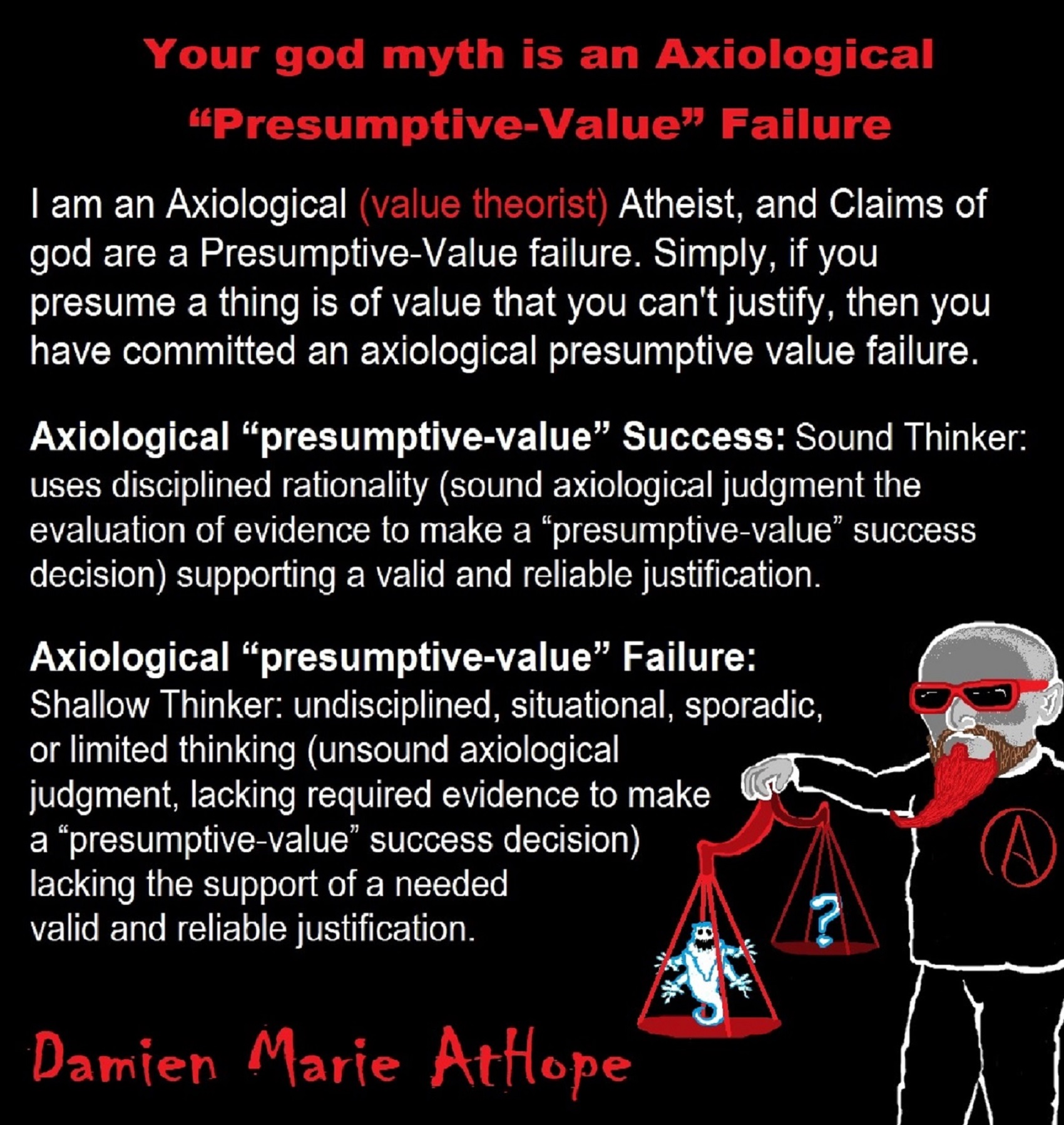
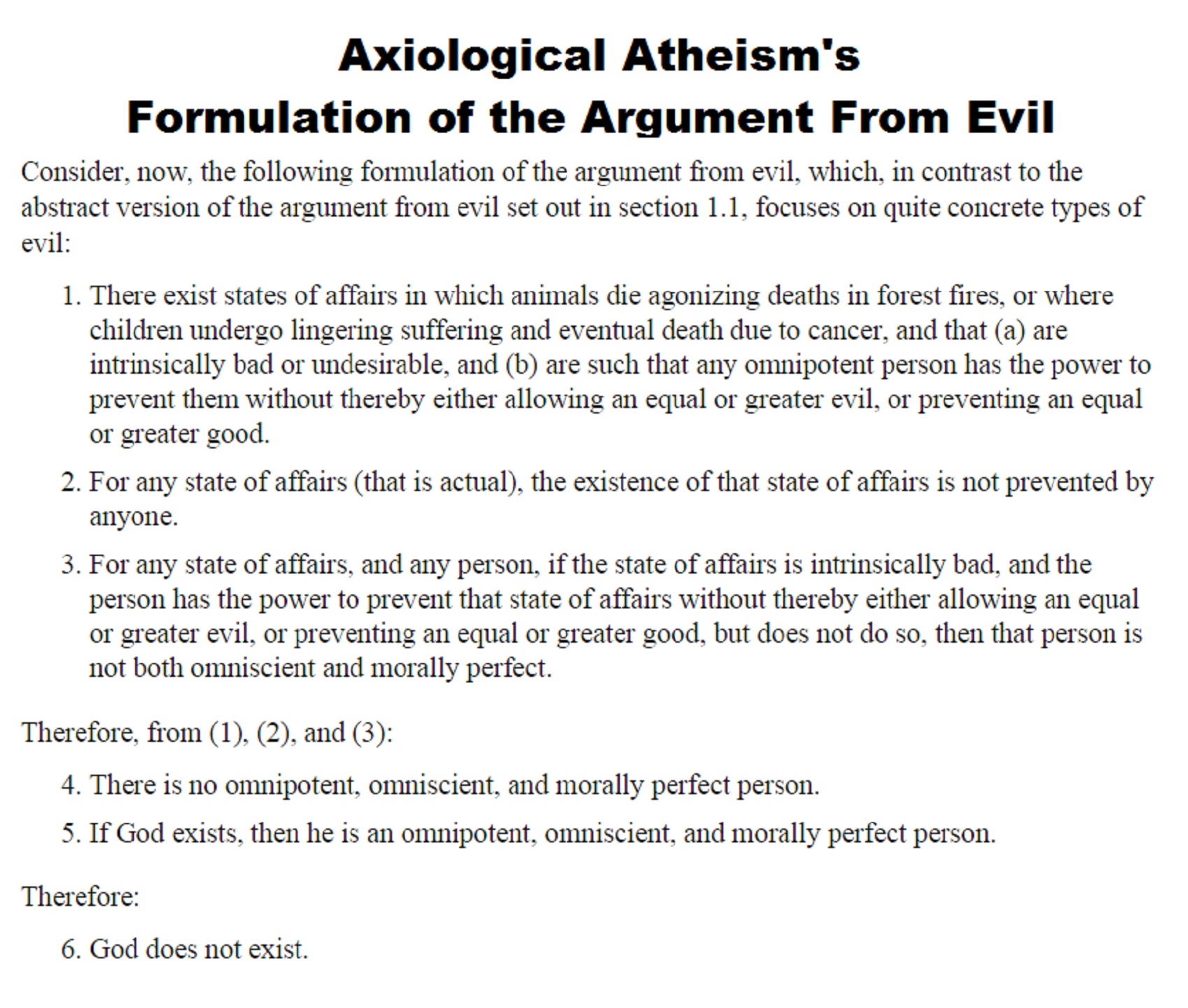
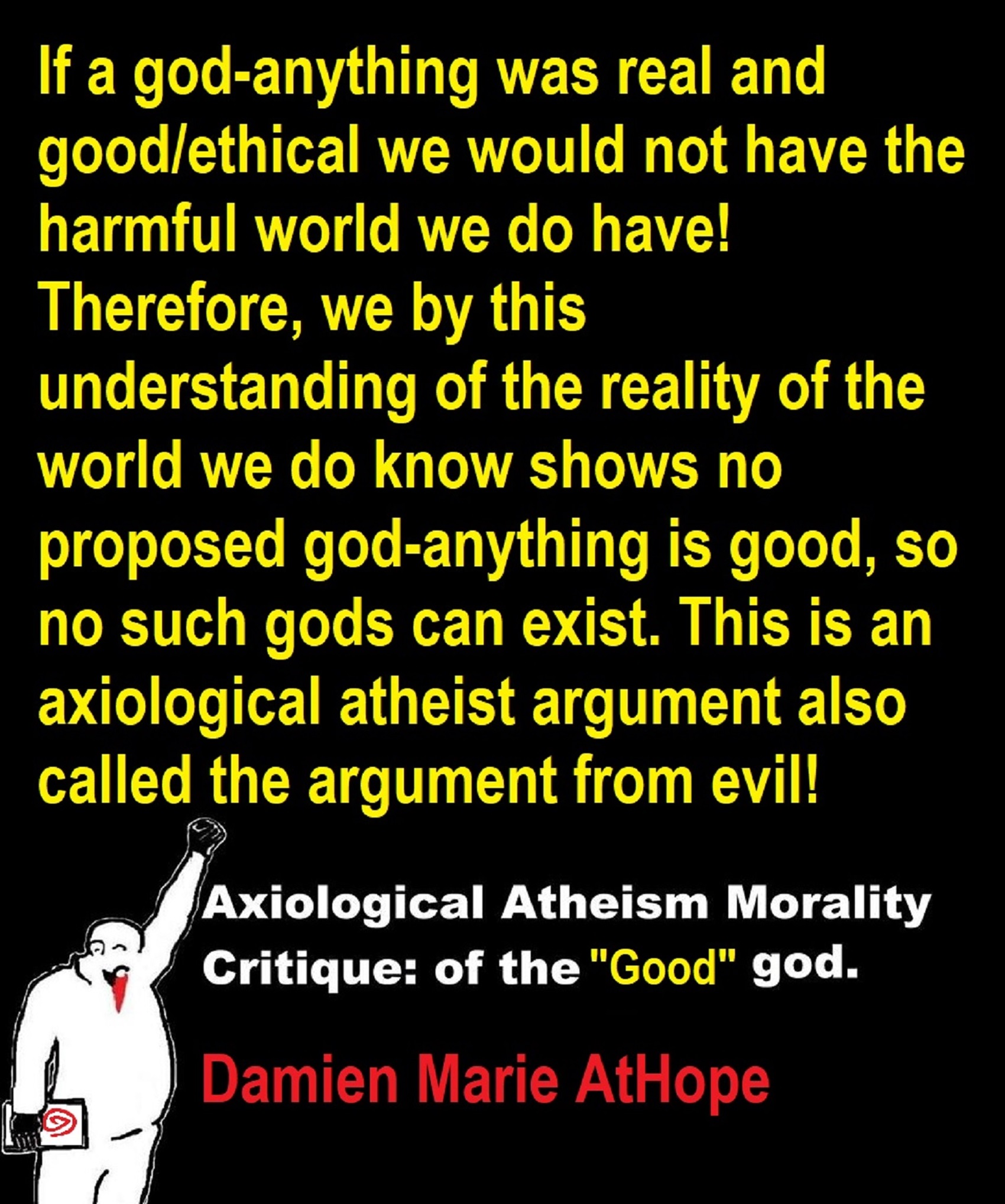
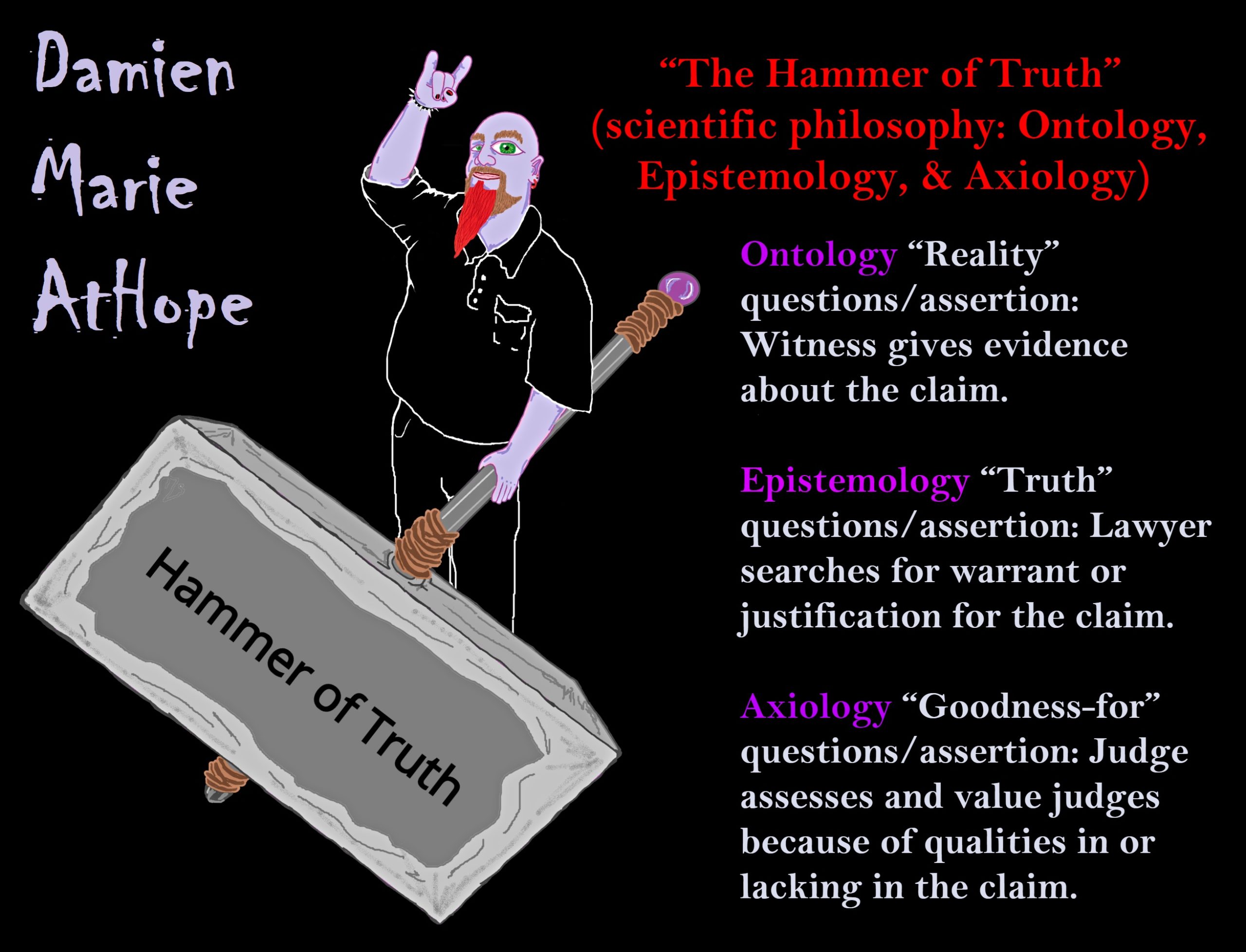
What are you talking about: requesting a good Ontology; thing/being “thingness” said to be known.
How do you think you know that: requesting a good Epistemology; the nature of “knowing”.
Why do you think that what you have deserves to be labeled “good” Axiology evidence; that is justified with valid and/or reliable reason (mental) and facts (external) pieces of evidence?
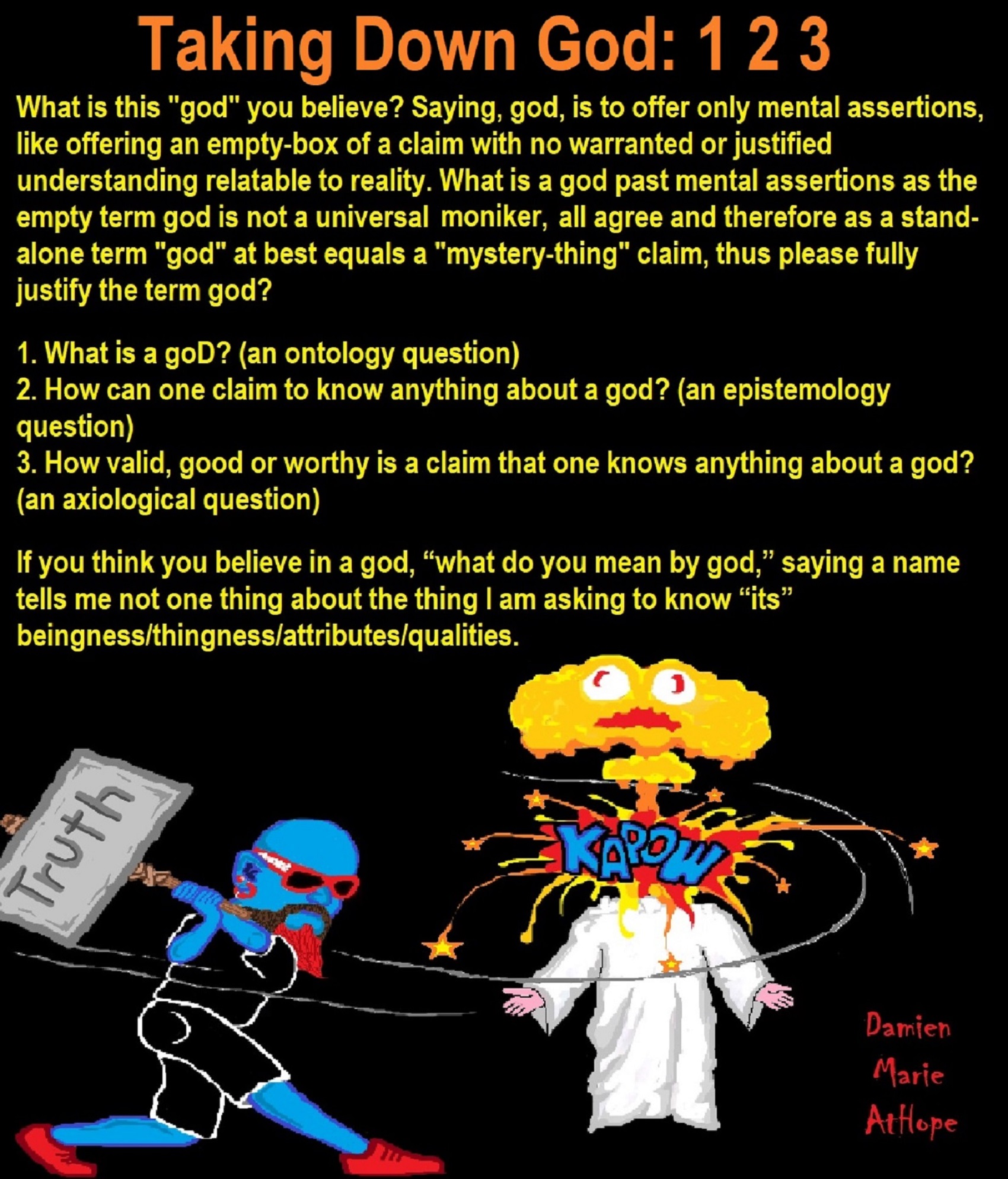
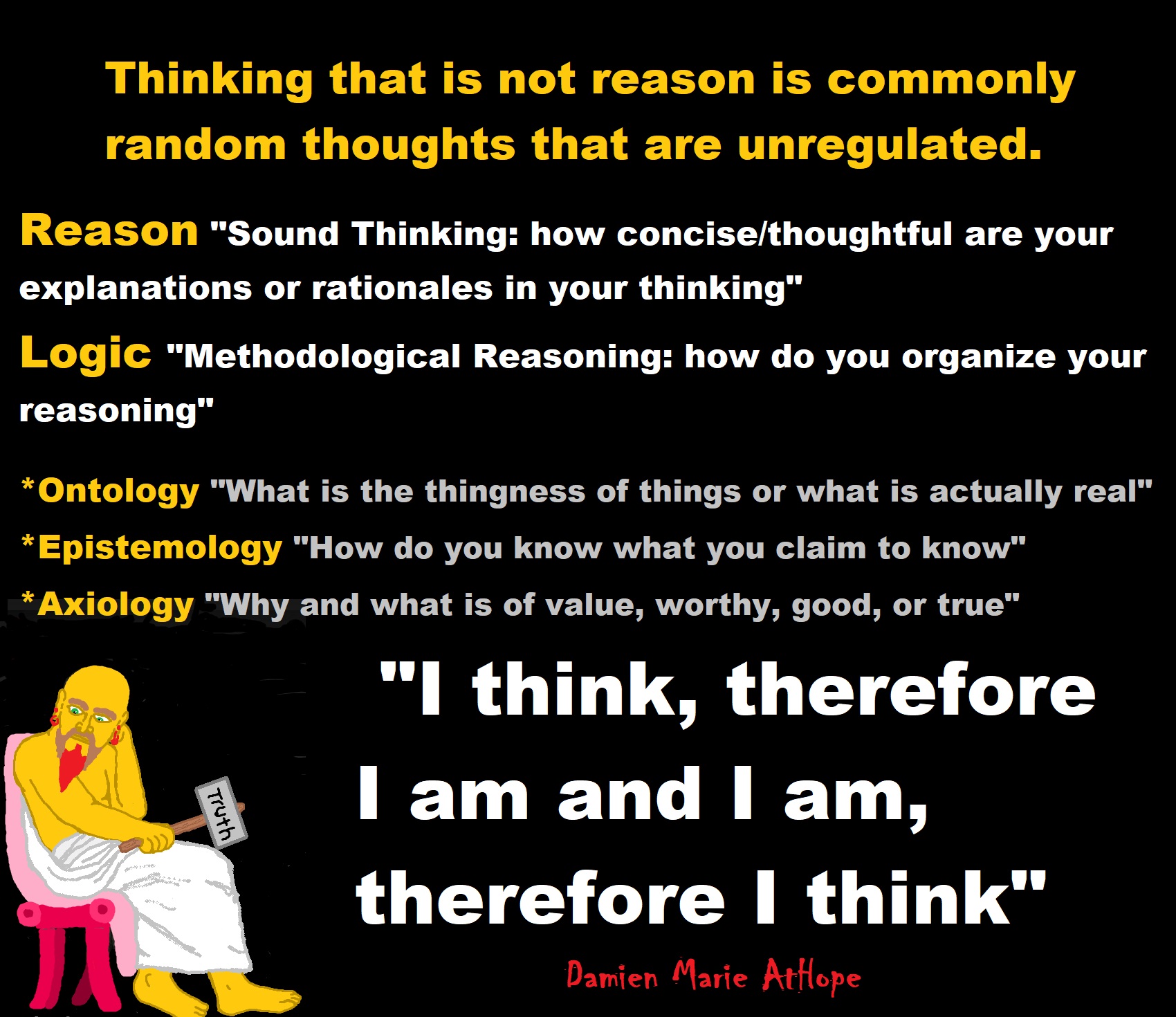
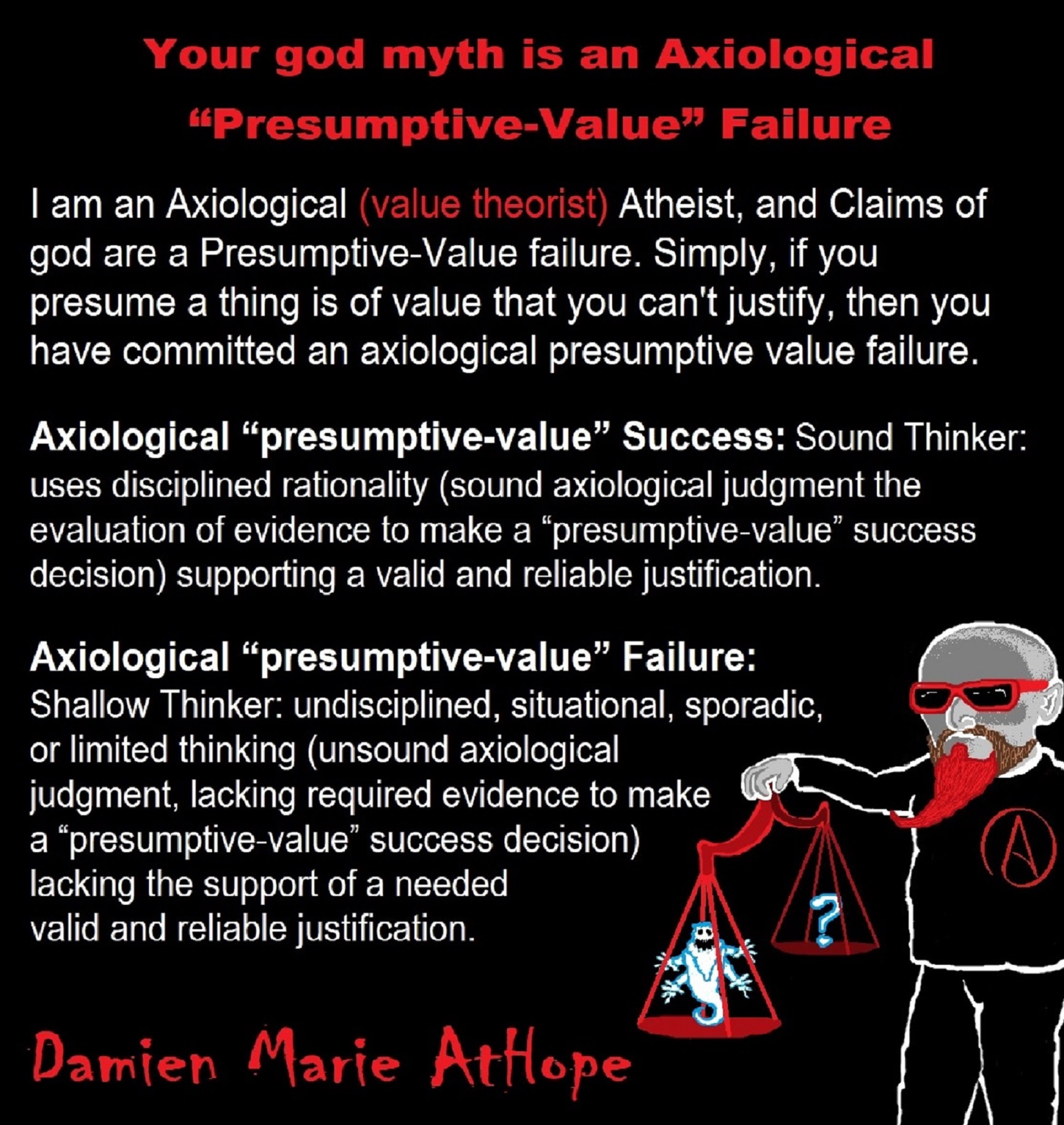
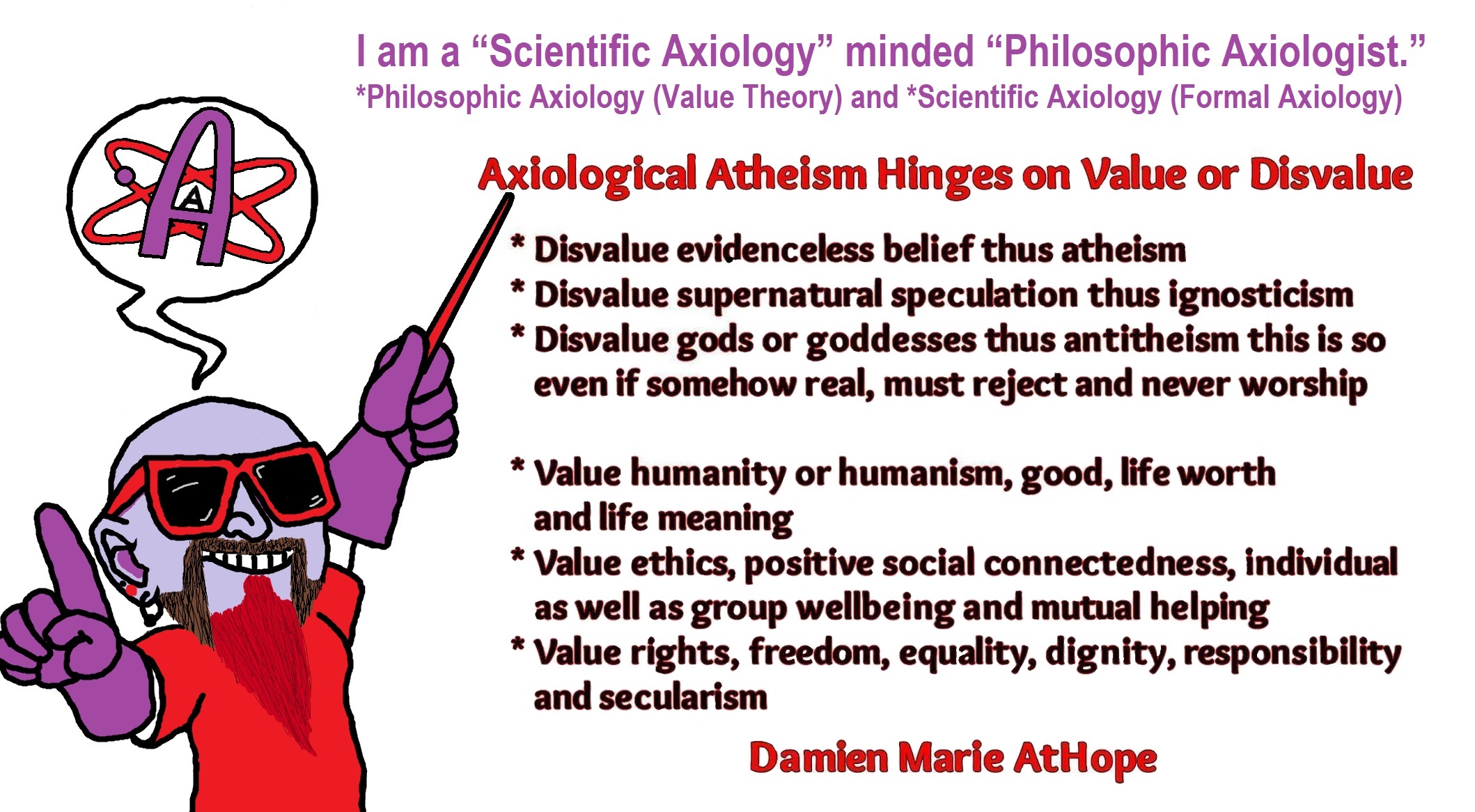
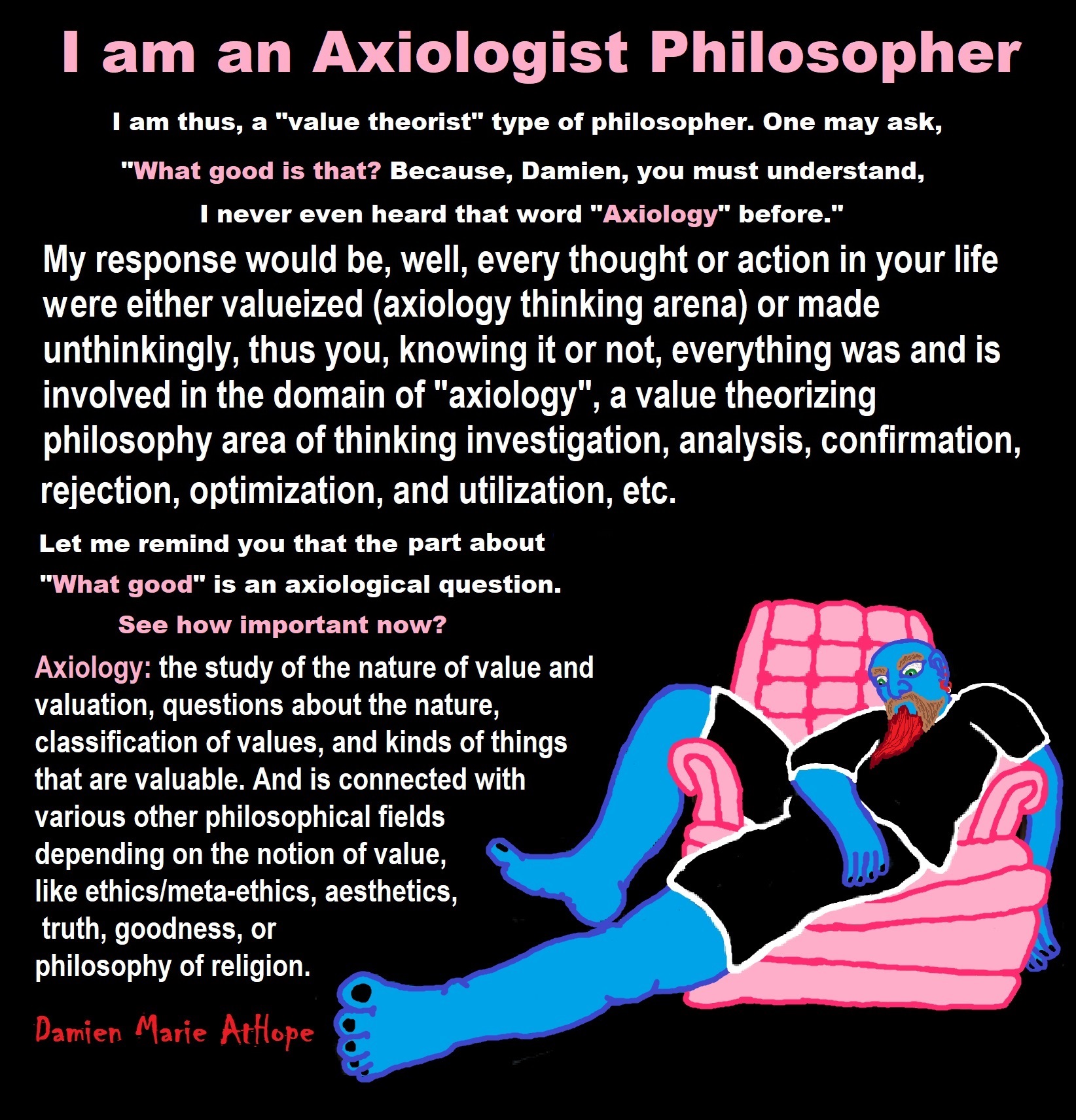
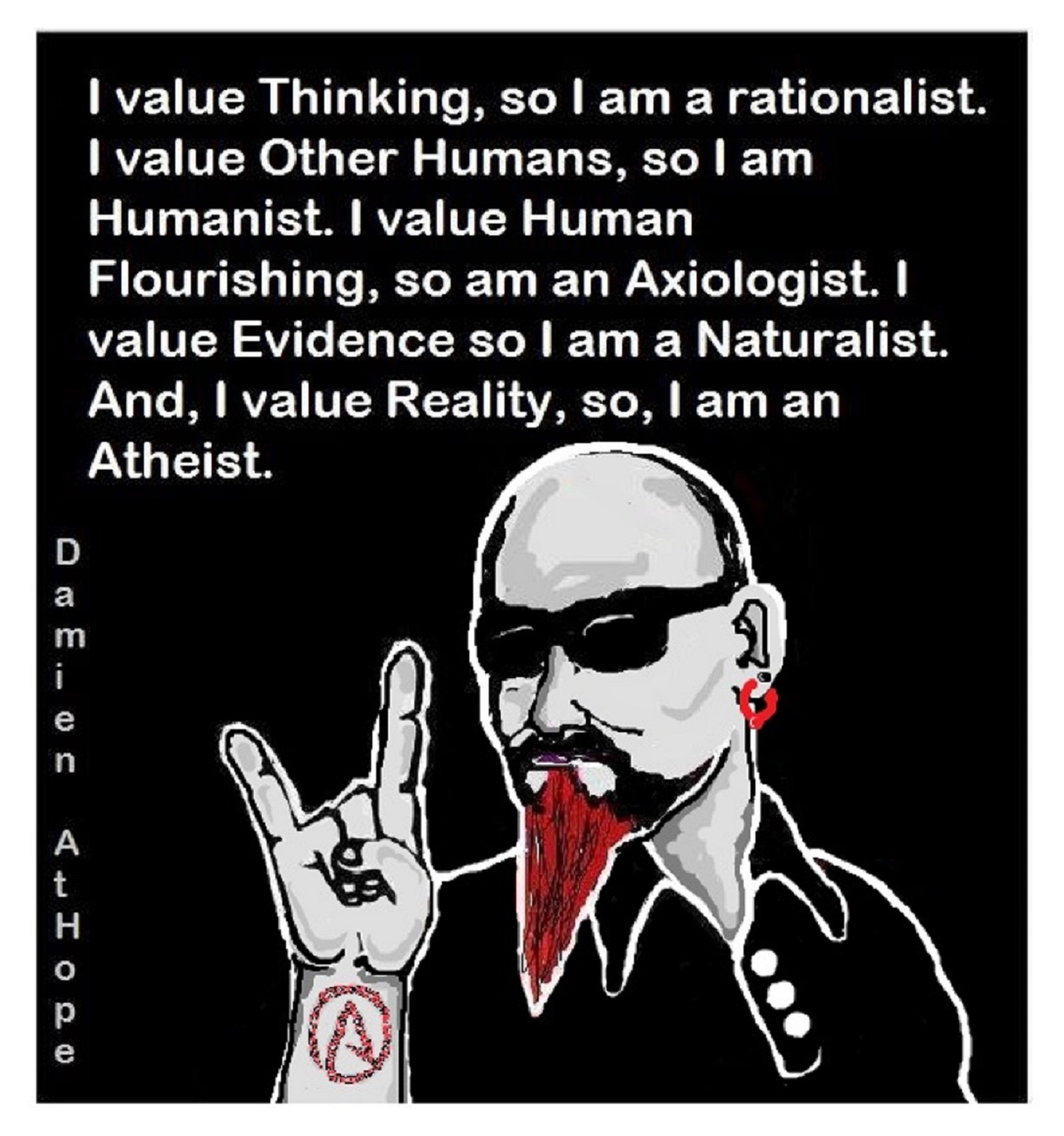
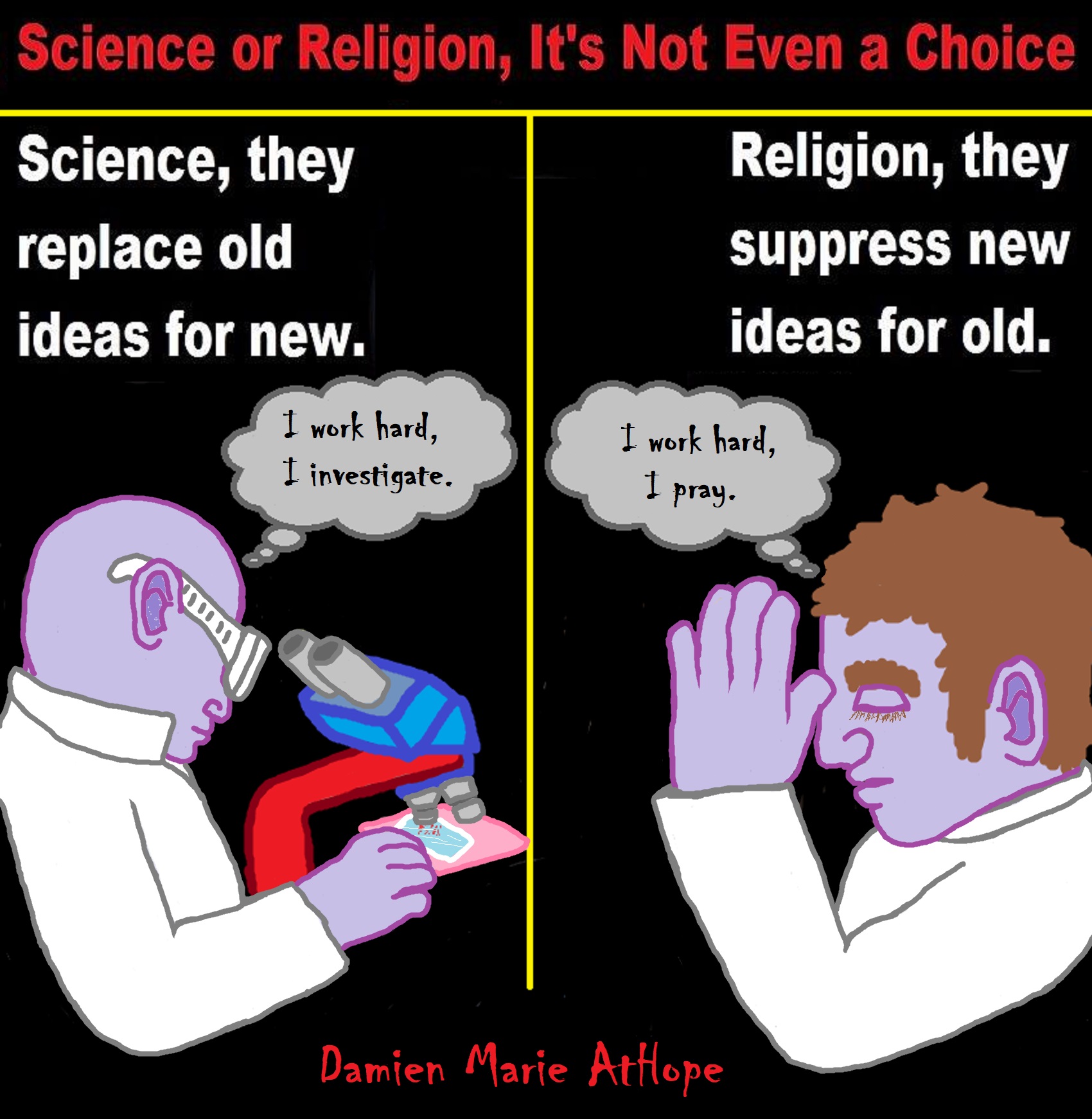
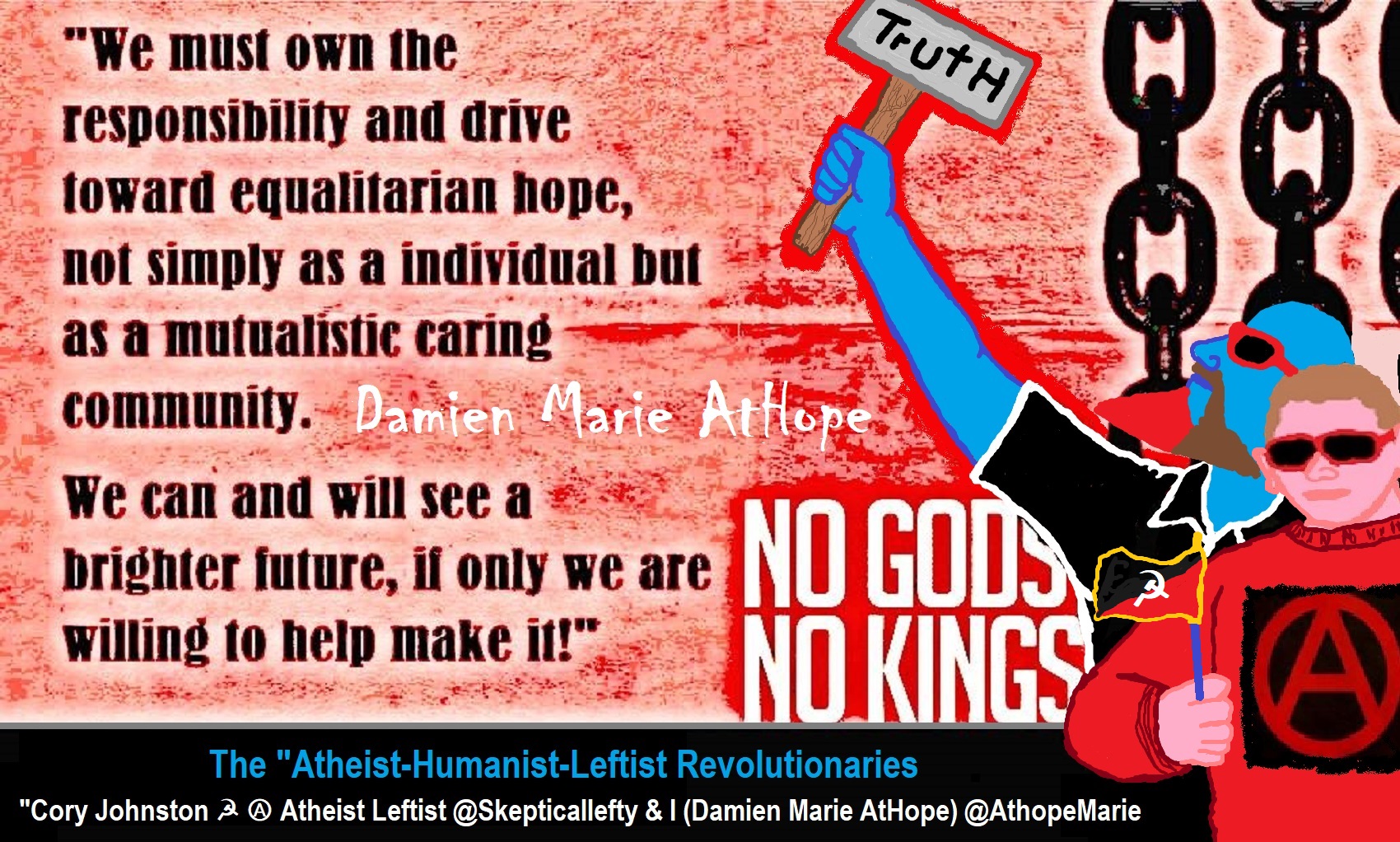
While hallucinogens are associated with shamanism, it is alcohol that is associated with paganism.
The Atheist-Humanist-Leftist Revolutionaries Shows in the prehistory series:
Show two: Pre-animism 300,000 years old and animism 100,000 years old: related to “Anarchism and Socialism”
Show tree: Totemism 50,000 years old: related to “Anarchism and Socialism”
Show four: Shamanism 30,000 years old: related to “Anarchism and Socialism”
Show five: Paganism 12,000 years old: related to “Anarchism and Socialism”
Show six: Emergence of hierarchy, sexism, slavery, and the new male god dominance: Paganism 7,000-5,000 years old: related to “Anarchism and Socialism” (Capitalism) (World War 0) Elite and their slaves!
Prehistory: related to “Anarchism and Socialism” the division of labor, power, rights, and recourses: VIDEO
Pre-animism 300,000 years old and animism 100,000 years old: related to “Anarchism and Socialism”: VIDEO
Totemism 50,000 years old: related to “Anarchism and Socialism”: VIDEO
Shamanism 30,000 years old: related to “Anarchism and Socialism”: VIDEO
Paganism 12,000 years old: related to “Anarchism and Socialism” (Pre-Capitalism): VIDEO
Paganism 7,000-5,000 years old: related to “Anarchism and Socialism” (Capitalism) (World War 0) Elite and their slaves: VIEDO
Paganism 5,000 years old: progressed organized religion and the state: related to “Anarchism and Socialism” (Kings and the Rise of the State): VIEDO
Paganism 4,000 years old: related to “Anarchism and Socialism” (First Moralistic gods, then the Origin time of Monotheism): VIEDO
I do not hate simply because I challenge and expose myths or lies any more than others being thought of as loving simply because of the protection and hiding from challenge their favored myths or lies.
The truth is best championed in the sunlight of challenge.
An archaeologist once said to me “Damien religion and culture are very different”
My response, So are you saying that was always that way, such as would you say Native Americans’ cultures are separate from their religions? And do you think it always was the way you believe?
I had said that religion was a cultural product. That is still how I see it and there are other archaeologists that think close to me as well. Gods too are the myths of cultures that did not understand science or the world around them, seeing magic/supernatural everywhere.
I personally think there is a goddess and not enough evidence to support a male god at Çatalhöyük but if there was both a male and female god and goddess then I know the kind of gods they were like Proto-Indo-European mythology.
This series idea was addressed in, Anarchist Teaching as Free Public Education or Free Education in the Public: VIDEO
Our 12 video series: Organized Oppression: Mesopotamian State Force and the Politics of power (9,000-4,000 years ago), is adapted from: The Complete and Concise History of the Sumerians and Early Bronze Age Mesopotamia (7000-2000 BC): https://www.youtube.com/watch?v=szFjxmY7jQA by “History with Cy“
Show #1: Mesopotamian State Force and the Politics of Power (Samarra, Halaf, Ubaid)
Show #2: Mesopotamian State Force and the Politics of Power
Show #3: Mesopotamian State Force and the Politics of Power (Uruk and the First Cities)
Show #4: Mesopotamian State Force and the Politics of Power (First Kings)
Show #5: Mesopotamian State Force and the Politics of Power (Early Dynastic Period)
Show #6: Mesopotamian State Force and the Politics of Power
Show #7: Mesopotamian State Force and the Politics of Power (Sargon and Akkadian Rule)
Show #9: Mesopotamian State Force and the Politics of Power (Gudea of Lagash and Utu-hegal)
Show #12: Mesopotamian State Force and the Politics of Power (Aftermath and Legacy of Sumer)
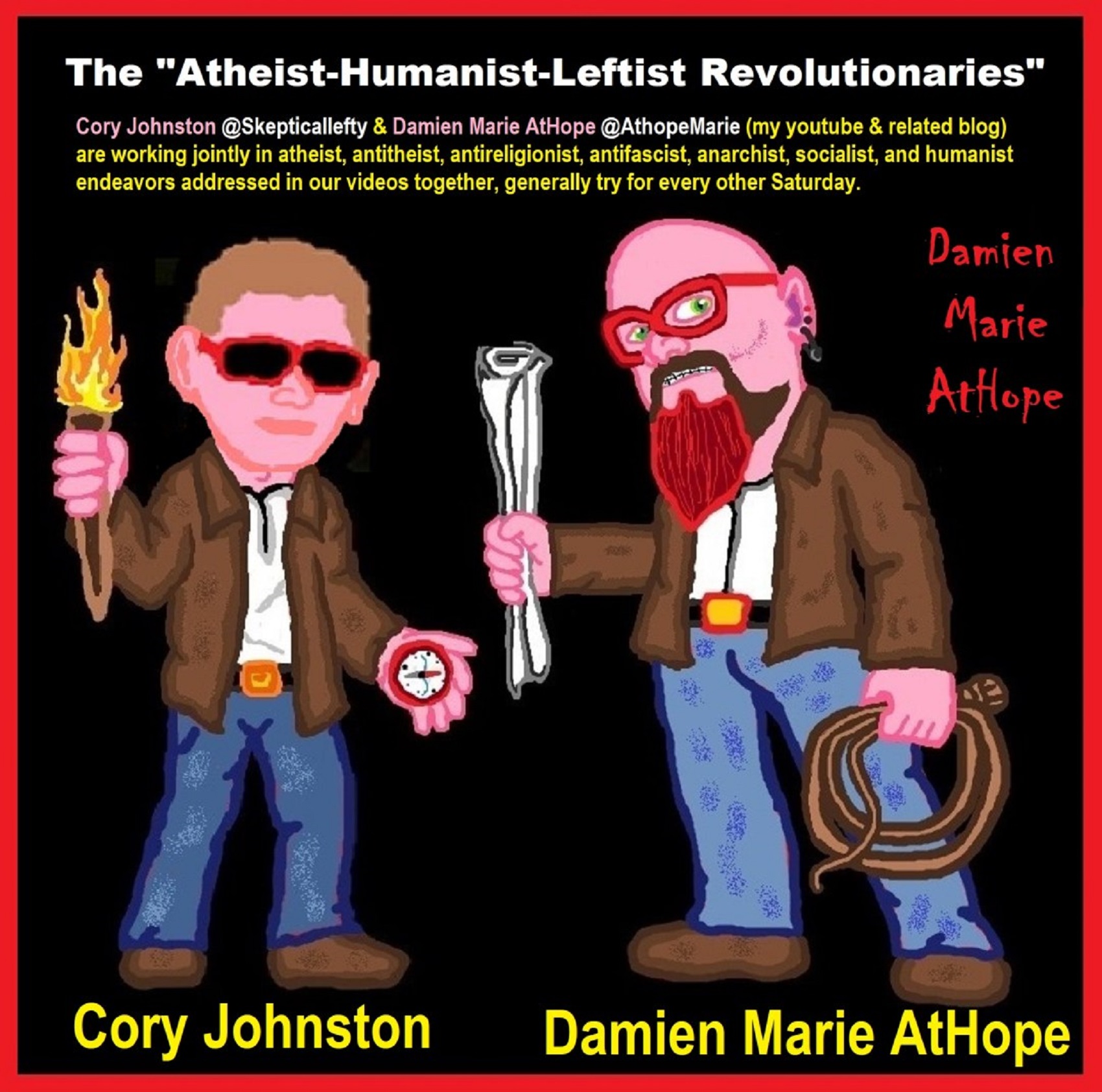
The “Atheist-Humanist-Leftist Revolutionaries”
Cory Johnston ☭ Ⓐ Atheist Leftist @Skepticallefty & I (Damien Marie AtHope) @AthopeMarie (my YouTube & related blog) are working jointly in atheist, antitheist, antireligionist, antifascist, anarchist, socialist, and humanist endeavors in our videos together, generally, every other Saturday.
Why Does Power Bring Responsibility?
Think, how often is it the powerless that start wars, oppress others, or commit genocide? So, I guess the question is to us all, to ask, how can power not carry responsibility in a humanity concept? I know I see the deep ethical responsibility that if there is power their must be a humanistic responsibility of ethical and empathic stewardship of that power. Will I be brave enough to be kind? Will I possess enough courage to be compassionate? Will my valor reach its height of empathy? I as everyone, earns our justified respect by our actions, that are good, ethical, just, protecting, and kind. Do I have enough self-respect to put my love for humanity’s flushing, over being brought down by some of its bad actors? May we all be the ones doing good actions in the world, to help human flourishing.
I create the world I want to live in, striving for flourishing. Which is not a place but a positive potential involvement and promotion; a life of humanist goal precision. To master oneself, also means mastering positive prosocial behaviors needed for human flourishing. I may have lost a god myth as an atheist, but I am happy to tell you, my friend, it is exactly because of that, leaving the mental terrorizer, god belief, that I truly regained my connected ethical as well as kind humanity.
Cory and I will talk about prehistory and theism, addressing the relevance to atheism, anarchism, and socialism.
At the same time as the rise of the male god, 7,000 years ago, there was also the very time there was the rise of violence, war, and clans to kingdoms, then empires, then states. It is all connected back to 7,000 years ago, and it moved across the world.
Cory Johnston: https://damienmarieathope.com/2021/04/cory-johnston-mind-of-a-skeptical-leftist/?v=32aec8db952d
The Mind of a Skeptical Leftist (YouTube)
Cory Johnston: Mind of a Skeptical Leftist @Skepticallefty
The Mind of a Skeptical Leftist By Cory Johnston: “Promoting critical thinking, social justice, and left-wing politics by covering current events and talking to a variety of people. Cory Johnston has been thoughtfully talking to people and attempting to promote critical thinking, social justice, and left-wing politics.” http://anchor.fm/skepticalleft
Cory needs our support. We rise by helping each other.
Cory Johnston ☭ Ⓐ @Skepticallefty Evidence-based atheist leftist (he/him) Producer, host, and co-host of 4 podcasts @skeptarchy @skpoliticspod and @AthopeMarie
Damien Marie AtHope (“At Hope”) Axiological Atheist, Anti-theist, Anti-religionist, Secular Humanist. Rationalist, Writer, Artist, Poet, Philosopher, Advocate, Activist, Psychology, and Armchair Archaeology/Anthropology/Historian.
Damien is interested in: Freedom, Liberty, Justice, Equality, Ethics, Humanism, Science, Atheism, Antiteism, Antireligionism, Ignosticism, Left-Libertarianism, Anarchism, Socialism, Mutualism, Axiology, Metaphysics, LGBTQI, Philosophy, Advocacy, Activism, Mental Health, Psychology, Archaeology, Social Work, Sexual Rights, Marriage Rights, Woman’s Rights, Gender Rights, Child Rights, Secular Rights, Race Equality, Ageism/Disability Equality, Etc. And a far-leftist, “Anarcho-Humanist.”
I am not a good fit in the atheist movement that is mostly pro-capitalist, I am anti-capitalist. Mostly pro-skeptic, I am a rationalist not valuing skepticism. Mostly pro-agnostic, I am anti-agnostic. Mostly limited to anti-Abrahamic religions, I am an anti-religionist.
To me, the “male god” seems to have either emerged or become prominent around 7,000 years ago, whereas the now favored monotheism “male god” is more like 4,000 years ago or so. To me, the “female goddess” seems to have either emerged or become prominent around 11,000-10,000 years ago or so, losing the majority of its once prominence around 2,000 years ago due largely to the now favored monotheism “male god” that grow in prominence after 4,000 years ago or so.
My Thought on the Evolution of Gods?
Animal protector deities from old totems/spirit animal beliefs come first to me, 13,000/12,000 years ago, then women as deities 11,000/10,000 years ago, then male gods around 7,000/8,000 years ago. Moralistic gods around 5,000/4,000 years ago, and monotheistic gods around 4,000/3,000 years ago.
To me, animal gods were likely first related to totemism animals around 13,000 to 12,000 years ago or older. Female as goddesses was next to me, 11,000 to 10,000 years ago or so with the emergence of agriculture. Then male gods come about 8,000 to 7,000 years ago with clan wars. Many monotheism-themed religions started in henotheism, emerging out of polytheism/paganism.
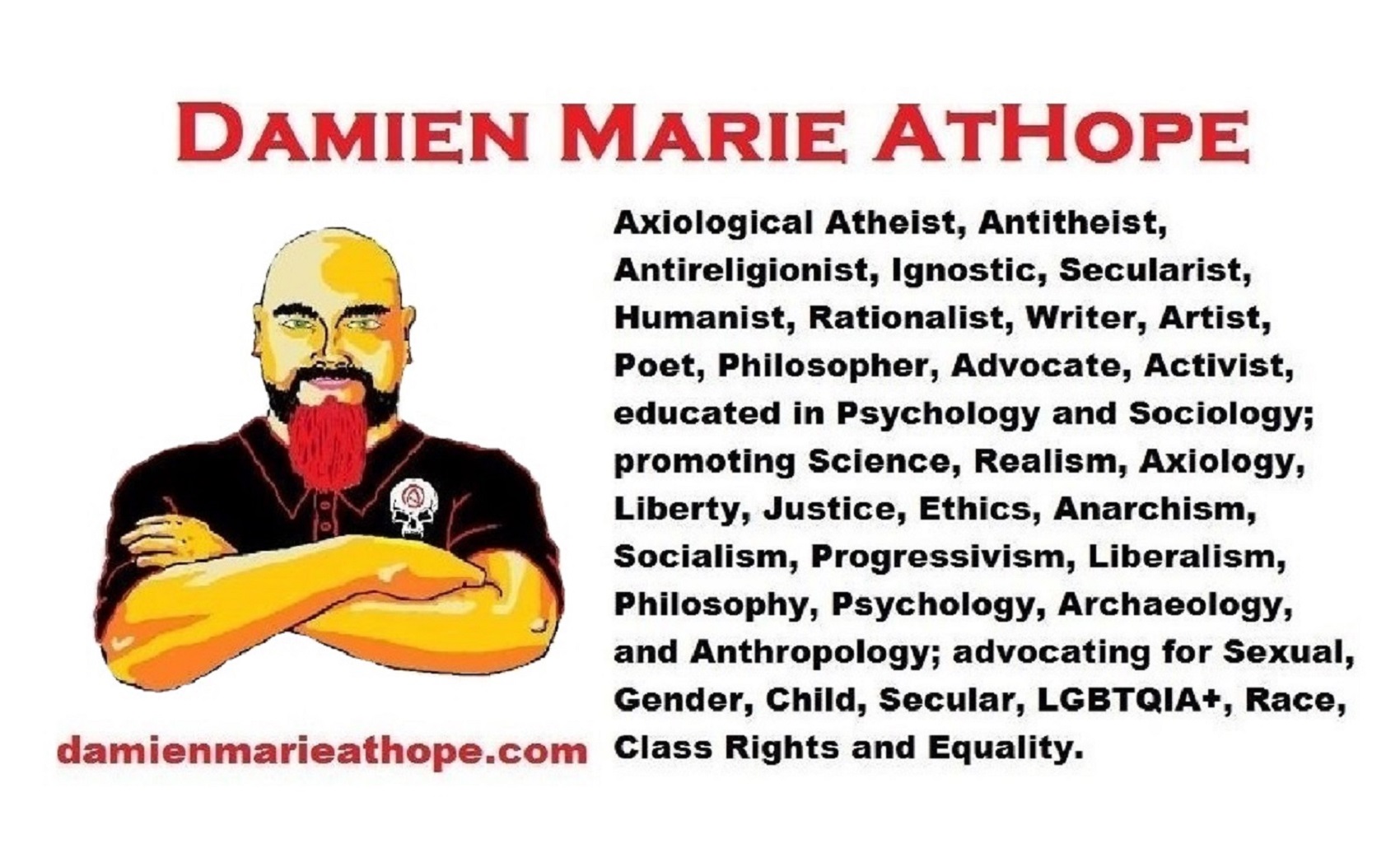
Damien Marie AtHope (Said as “At” “Hope”)/(Autodidact Polymath but not good at math):
Axiological Atheist, Anti-theist, Anti-religionist, Secular Humanist, Rationalist, Writer, Artist, Jeweler, Poet, “autodidact” Philosopher, schooled in Psychology, and “autodidact” Armchair Archaeology/Anthropology/Pre-Historian (Knowledgeable in the range of: 1 million to 5,000/4,000 years ago). I am an anarchist socialist politically. Reasons for or Types of Atheism
My Website, My Blog, & Short-writing or Quotes, My YouTube, Twitter: @AthopeMarie, and My Email: damien.marie.athope@gmail.com


